#something something 'people only acknowledge queer subtext when it's two men'
Explore tagged Tumblr posts
Text
One of the strangest critiques I see over The Dark Descent is that it made everyone straight and...I don't have the original novel for comparison, but I'm not certain that ANYONE in that book (except for MAYBE Judge Frankenstein) was straight
#something something 'people only acknowledge queer subtext when it's two men'#the dark descent of elizabeth frankenstein#you have elizabeth literally going on page and saying 'i'm not certain i can feel romantic love for anyone'#and creating a found family with Mary and Adam#also even with Henry like...Elizabeth frequently talks about his love for Victor and her love for Victor#i really don't think that Henry's straight in this novel#and it COULD be more explicitly queer but like...again. elizabeth saying 'I'm not certain I can feel romantic love for anyone' --#she's either aromantic or a lesbian#and that's. fine.#she's queer. she's a canon queer character.#you have justine also saying that she doesn't want marriage or children#and it COULD be a distrust of men in general#in keeping with the novel's take on male/female relationships (which I have mixed feelings about)#but also. like. if she were a man. we would be saying she was gay.#and i don't see why that has to change.#and Mary?#you have three female characters who both feel limited-at-best attraction to men.#but NO the novel's STRAIGHT
3 notes
·
View notes
Text
Moominvalley: Or Not at All
A long post about Moominvalley through the different seasons. Planning, potential, promises, and outcomes.
This won’t go super far into detail about season 4 but it will talk about a certain outcome as well as handling of characters and relationships. If you don’t want any spoilers or info on the fourth season steer clear
(I’m not the best with titles)
I watched season 4 of moominvalley last night and I was pretty dang disappointed in how certain things were handled. Don’t get me wrong. There was some nice stuff. But it still felt like it was largely missing what made me love the show so much from the start. As well as things I had been looking forward to from the books. Above all else, I feel like their handling of the fandom’s favorite pairing was bad. I can’t even begin to put into words how upset I am since gutsy and by extension moominvalley felt like a company that wouldn’t do this. I want to put my thoughts on paper so to speak.
It’s insanely disappointing to know that this company has been queerbaiting since day one. This show is a huge comfort to me and it was nice to watch since it helped me feel more at ease with my own sexuality. But now that feeling has been largely reversed because I know that those moments were manufactured to sell the show only for them to drop them by the end. So let’s look at things
Queer coding has existed for a long time. It’s helped creators give hints and nods to a character’s identity or hints of a relationship when times and places don’t exactly allow for it. There are many stories that have queer coding and give this beautiful subtext that those in the community can enjoy. Even though it would remain ambiguous whether a character was gay or two men or women were dating, the coding allowed it to be suggested even when it wasn’t allowed given the time period.
Queerbaiting is almost the opposite of this. Queerbaiting comes about more from existing in a time or place where it is accepted but instead of giving genuine representation, a person uses the desire to see that representation to sell a product. Moments between characters that are clearly more than friendship only to disappear - often replaced by a hetero pairing. (Tbf the character who was implied to have feelings for someone of the same gender would still be bi or pan but it stings when the idea of something between two people of the same gender was suggested but removed) Queerbaiting has been an extremely frustrating thing to experience in fandom spaces. Series like voltron, sherlock, supernatural, etc. You get invested in these characters. There’s a possibility and every moment that suggests it could be more gets you hooked. Similar to how miraculous viewers became invested in the romance that’s hinted since day one. If you put the time and effort into using that for a story and draw people in with it only to take it away it’s bordering false advertising. It sucks because you spent time caring about it and waiting to see how it would play out.
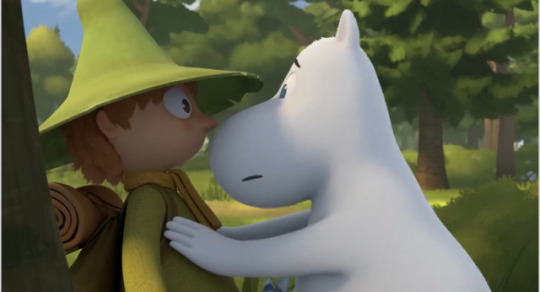
I mean just look at this. The moominvalley team did this deliberately. I mean, they included that one scene in the teaser which made it seem like more snufmin. It felt like a taste of what the season would offer but in reality it was one of few crumbs. And I mean crumbs. Because compared to the other seasons there was hardly anything. Their moments didn’t have this underlying feeling that they usually did. Every other season felt like it had underlying feelings to be explored. But here it became hollow. And snufkin took a backseat to a lot of the action this season
But they definitely knew that the fans were interested in this pairing. It’d be tough to get into the moomins without knowing about this part of the story and community. And they acknowledged this idea of moomin and snufkin multiple times in interviews and qnas.
youtube
youtube
And voice actors aren’t the ones who decide but there were more than just vas discussing this.
This series started off with their relationship. Episode one ended with the first mention of snufkin who’d be returning to the valley in the very next episode. That entire second episode gave a clear look into how their relationship would develop throughout the series. Moomin waiting for snufkin longingly while snufkin took his time until showing up felt right all while missing moomintroll. This episode has a sort of sense that there could be something more to them. Especially seeing as moomin is more focused on snufkin than snorkmaiden, his love interest. The following episode gives us this:
youtube
And while moomin wants the dragon to be his loyal pet, we know that “And just promise me this, that you'll give me all your kisses Every winter, every summer, every fall”
is referring to somebody other than that. This leaned much heavier into the potential for something beyond friendship between them.
There are the usual moments that could go either way, with focus between them and close contact.
youtube
This is more similar to other adaptations where they have a clear, close relationship. But in most of those you could come to love the pairing but you generally know they won’t do something unambiguous. Just the occasional scene that could be read as potentially romantic.
Moominvalley doesn’t strictly stick to this though. It feels similar to the original works where there is something ambiguously there. Then it further implies that there will be something important between them storywise. You get Tooticky saying that there are other lost souls waiting to be heard before the camera cuts to Snufkin leaving the valley alone.
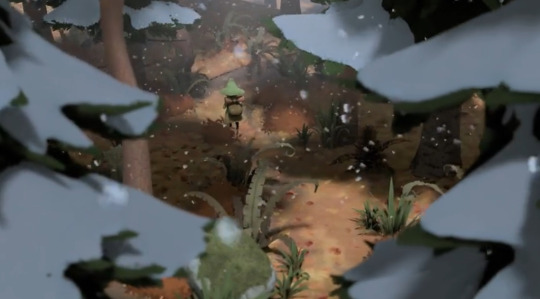
And this didn’t really get fulfilled in any real way. Yet it implies that the future of the series will go in a direction where moomin is the one to help snufkin in some way. That part isn’t even romantic, but it goes to show that they stopped focusing on this important connection between them.
Their relationship in season 2 continues very beautifully. Moomin immediately wants to go make sure snufkin is okay when the volcano’s gonna erupt. There’s an entire conversation that highlights their difference of perspective with loving vs possessing in regards to the ruby and the hobgoblin. Something that is linked to their relationship and things they need to figure out. Then when they have to leave the valley, moomin wonders if he’ll ever see snufkin again. On top of that, he and snorkmaiden have their break up.
Which I want to talk about their relationship a bit. A majority of the episodes that feature them as leads do it with a wedge between them. Their relationships is honestly not great going both ways. They clash and are generally unhappy. And usually moomin has to apologize for something that doesn’t exactly feel is entirely on him. Little My I get. I mean he didn’t think the note would get to mymble but this was still a genuine mess up on his part. But he ended up on a rock in the middle of the sea over the ghost episode. And snorkmaiden spends much of their time making a home together getting angry because he misses his family and hasn’t come to terms with saying goodbye to them. There are times they’re together where he’s selfish and she’s just angry at him. They don’t feel like a happy couple to cheer for. Back in 90s moomins I actually did like them. They were cute. I was a bit divided between that and snufmin because there were these moments that really did count for a lot and had such a wholesome feeling. But moominvalley honestly made me cheer for a break up. Meanwhile, he and snufkin have this relationship that they’re navigating in moominvalley. They don’t argue much even when they have different perspectives. Moomin admires snufkin and in some ways tries to emulate him. But all while still being his own moomin and figuring himself out.
The two are still given parallels in little moments such as zooming in when they take each other’s hands.
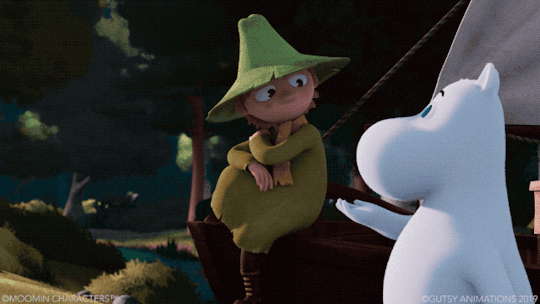
So back to season 2 and how it handled snufmin. When moomin leaves the valley we see snufkin dealing with that absence for a change. He begins to understand how moomin feels when he’s gone. While he’s at the moomin house he seems pretty in his element for the most part. He seems happy to play along and give toffle an idea of what the moomin family was like. But in that there are scenes where he’s looking for a note. We see bits of how much he misses moomin and wants to know where his friend has gone and when he’ll be back. This is the beginning of a shift in their relationship. Because snufkin gets to feel what moomin feels like. And when he hears that the moomins are coming his face lights up the way moomintroll’s would.
youtube
They’re often portrayed in a way that shows that they’re the most important person to the other. There’s this sort of soft undertone that seems to suggest feelings. And all while their relationships grows and changes and they become all the better for it.
Also there’s this
youtube
Season 3!
Season 3 felt like there was a change in direction. I feel at this point that there was deliberate queerbaiting but I also know that there was a shift somewhere around season 3. We got the music cut. The voice actor for moomin changed. There were some adjustments with the writing team. But they still deliberately put in scenes with this duo. And with romantic framing. I could be convinced that season 1 and 2 were made with the idea of them as endgame in some capacity. That the queerbaiting wasn’t from day 1 and that it began here. There were really great moments with them. But it feels like they shoehorn snorkmaiden in as a romantic interest again. A lot of episodes with her here don’t exactly make it explicit but there are some that nail it in. They reunite and it almost feels like they’re back together again without a full conversation. Especially with the final episode. I feel like the narrative would’ve been richer if they hadn’t done that considering the way they’ve been building snufmin up.
But I’ll focus on moomin and snufkin for now. When snufkin sees moomin again moomin goes for the greeting he’s been used to but snufkin gives him a hug. That description alone won’t do it justice though. The music rises as it zooms in on their eyes as they make their way to each other. When snufkin hugs moomin you can see the joy from both of them. It shows how their greetings and by extension their relationship has evolved over the seasons.
youtube
And then it cuts to snorkmaiden.
This becomes a notable pattern in season 3. It’ll give a really meaningful scene that pushes snufkin and moomin in a more romantic light only to undercut it by reminding you that snorkmaiden is here. It’s at this point where it feels like they know a ton of fans are here for snufmin. They include the pairing. But they also seem to be reminding us that snorkmaiden is here to stay and in a more romantic way. But there’s still this hope, especially if you recall everything from seasons 1 and 2 and the way that they felt. Especially if you rewatch them right before watching season 3. And the show very clearly uses that and makes it feel like there’s a chance. Makes the viewers hope and stick around to find out.
So let’s go through season 2. Moomin and snufkin make some progress on their relationship. They’ve switched positions now and have more of an idea of how the other feels when one of them leaves. And from there they communicate that. Especially moomin. This is shown to a degree in the episode with the fairgrounds. Again in lonely mountain. There are also little nods here and there about their relationship. But again. Lonely mountain is the big one. It starts with little my getting on moomin’s case for worrying over his ‘precious snufkin’
As usual moominmama also seems to act like she knows there’s something more to his relationship with snufkin. Papa remains oblivious though. There’s a parallel between the parents and snufmin too. But the most well known part is this
youtube
look. there’s nothing remotely platonic about this. This is one of those things that someone straight and homophobic could detect. The point where they’d stop arguing ‘they’re just friends’ because there’s no way that’s all. I mean just listen to moomin’s “yes” when snufkin goes to add something. There’s so much hope and feeling in that word that I would love to get my hands on the script to find the voice direction for that. I mean come on
And better yet it ends with an interruption so we know they’ll have a whole heart to heart later. A conversation where they lay out their feelings. The feelings that were clearly present here.
Except they don’t
Anyway the season goes on. Moomin, snufkin, and obligatory third wheel sniff go on a journey to take the sun back after it was stolen. They get it back and the season ends with a beautifully queer scene that promises more to come from these two.
youtube
Except that a few minutes prior snorkmaiden calls moomin her soulmate and they have their usual thing. And even after snorkmyden really did get some good content this season.
Look, I know that snorkmyden was probably not on their minds throughout production. There’s a difference between the way they handle snufmin and the way they handle snorkmyden. Both duos get great development in their relationships but while there are a ton of cute moments between snorkmaiden and little my, it never feels like there’s a focus on making that endgame. It feels more like snufmin did in some of the other adaptations - something with cute moments and a genuine bond that could be seen as romantic but it’s highly unlikely it won’t be. I want to say this since this series didn’t feel that way for snufmin. It felt like the first chance of it working out fully. I put a lot of scenes in here showing it but the first two season really show it in a way clips and gifs can’t. There’s just so much there and it’s beautiful and sweet. It feels hopeful for them.
Until season 4. Season 4 feels like the team shrugged off all of it. They step even further away. It’s like season 3 but without any of the scenes between them. Suddenly, you’re looking at scenes between them where they talk and have physical contact but the deeper feelings are completely gone. It’s like the anime. Where you can smile about it and think ‘aw them’ but you know it won’t happen. They heavily lean to snorkmaiden and moomin instead. This is the final season. They know people will watch to see if moomin and snufkin go anywhere romantically. And even if people don’t finish it, they’ve got people paying for memberships just to see if it happens. So it doesn’t matter if it doesn’t happen. Because they’ve secured the views and the money.
I do want to say that when I refer to it as becoming canon I don’t know if they’d call each other boyfriends or even kiss. But I would expect them to acknowledge it as there being something more. Like the series ending with them having a discussion about how much they mean to each other. Something that shows they’ll go into the future and continue to get close. Physical closeness like a hug or one putting his hand on the others or even just leaning against each other. Whatever it would be I’d expect more than this. Because they very clearly built these two to be inseparable in that one required the other to undergo their full arc. The show starts with a promise that their relationship will be close to the story. But then season 4 hardly shows snufkin at all
This is what queerbaiting is. And I never expected it to happen with this series. Not after the team talked about it with care. It’s such a gut punch after waiting for five years to see how it’d turn out. I don’t know if they always intended it to be a way to bring in customers. Maybe it was initially going to work out but they changed it between season 2 and 3. I don’t know. But this. This really is queerbaiting. We live in a time where gay relationships are more accepted. They show up in the media more. We’re finally at a time where this relationship could be made more explicit instead of having this ambiguously romantic subtext. And if someone made a new adaptation of moomins and didn’t do that, that would be perfectly and completely fair and okay. If they didn’t consistently imply that there could and even would be something more. But here they used a very old and well loved pairing to gather fans and make money only to never have it come to fruition. Season 4 of moominvalley felt like companies on july 1st. I literally can’t think of a better comparison for how it feels. The first video starts with the quote “The Spring Tune is where we say that this series is going to be different. That you’re going to have to wait and give it time and just be patient. And wait for the story to unfold.”
And so many people did. But then it turned out like this. And I don’t know if that was always the intention. Because it feels like that interview was suggesting that it would go in that direction. But heck. The whole series up until season 3 felt like it would go in that direction. And then it didn’t.
Gay representation is something that has a huge positive impact on the lgbtq community. Even more so on the world overall since it allows people to see these relationships and shows that it’s okay for people to be gay. And it would be even nicer for a series that started off with that subtext got the full representation now that we’re in more accepting times. And it felt like it would be even more meaningful with recent treatment of gay stories.
Our flag means death was cancelled, shadow and bone, the owl house had its final season drastically shortened, good omens is only getting a single episode for their finale
Many are just getting dropped and in a time where this community needs them more than ever. These are shows that make people feel seen. Shows that bring a feeling of joy and comfort and acceptance. And it’s even worse to see that there’s still queerbaiting now. This could’ve had such a beautiful ending and likely would’ve been loved for many years to come if they committed to what they’d built up all this time. How could someone take a series created by a woman who not only added subtext in her original stories but was bi, and use it to build up a romantic story just to bring in money and then toss all that development away. I don’t know what else to say other than this is queerbaiting. And the gay community deserves better. I really did believe that moominvalley would do better by us.
#moominvalley season 4#moominvalley#moomins#snufmin#snufkin#moomintroll#long post#moominvalley spoilers#Youtube
185 notes
·
View notes
Text
A lot of people who have never watched it assume that because ‘Xena: Warrior Princess’ is a 90’s TV show, watching it today, it would come across as dated.
That assumption is not accurate. Xena was actually ahead of its time in many ways. Really, the only things “dated” about it is the CGI and some poorly thought out transfemme caricatures used for comedic relief.
It’s socio-political discourse was very far ahead in time to the point that if the gender critical people that of today watched even just one episode, they would most definitely claim that it’s “woke” because of the women empowerment and LGBTQ+ ideas, themes and narratives. It’s very pro-feminism unlike its predecessor, ‘Hercules: The Legendary Journeys’ that had males as lead characters rather than females. It’s the type of TV show you could watch where you’d be reminded of many other women-led and WLW shows of recent. But this really was the first one that took women seriously as TV art/entertainment action heroes as well as very serious romantic domestic partners. It’s not “dated” as far as the writing goes because you constantly get three-dimensional characters. Both male and female.
It’s a much more realistic and validating experience. However, with it being the “first”, it has its setbacks.
Such as the queer representation enclosed in subtext and ambiguity. Something of which I personally prefer when it comes to WLW representation because of the vast room for interpretation it allows but many would not. But once again, even though this is true, the writing comes through regardless of that and the romantic chemistry between the two lead female characters is good enough that it’s a non-issue because it still provides an authentic and compelling long term loving relationship between two women that you won’t or would very rarely see elsewhere. I mean I haven’t seen anything in TV art/entertainment that really matches the relationship between them, let alone supersedes it.
It’s the FIRST and it’s the BEST as far as I’m concerned.
There are other ways it shows its age but for the most part it’s something that will still be very enjoyable and interesting to watch being aware of the way things are today, which can’t be said of so many other 90’s shows.
Give it a watch. If the pilot doesn’t get you (it will), you can tell me I don’t have a clue what I’m talking about. I acknowledge its flaws and mistakes but when weighing the pros and cons, I think those things just go to prove to you its overall accomplishments given its 90’s made.
I implore people that watch it to keep focused on the historical context surrounding its production so that they can understand just how far ahead in time it was. It was much harder to achieve what it actually achieved then compared to now. Partly,… because it achieved it.
There are so many TV shows I could tell you wouldn’t have been successful or even wouldn’t have happened without it. Buffy. Charmed. Wynonna Earp. Warrior Nun. I could go on… It’s such a strange thing to think about that partially the reason why it stood the test of time was because it was the first one to attempt to stand it.
Because its creators were fearless and crazy and brave.
They are also men. Straight white middle-aged men.
And they created this wonderful pro-fem TV show with so much in it that is admired and appreciated today by so many women and feminists and gay or queer people.
It’s not perfect. But it’s honest and it’s truly on our side.


#xena warrior princess#xena and gabrielle#xena#lucy lawless#gabrielle#renee o'connor#it’s a 90’s show#but it’s not dated#give it a watch#female representation#wlw representation#queer representation
5 notes
·
View notes
Note
"Pointing out that fictional characters aren't real never leads to anything, aside from sometimes the accusation that liking certain ships hurts real people." HOW? how does liking to ship Alear with the children of an alternate version of their evul dad hurts people ?? How does liking Byleth with their ex- students hurts people ?? How does liking Robin marrying the alternate version of their kids' friend thanks to time travel hurts people ??
By that logic, would'nt Chrobin, a ship consisting of shipping a man with the alternate version of his muderer hurt people too ??
It's typically framed as normalizing problematic things that have hurt people in real life. In this case though there will never be the acknowledgement that FE's stock in trade for incest is winking subtext between siblings, with other types being rare and with actual parental incest (what people usually think of when it comes to real-life cases) being limited to a single instance in Three Houses that's unambiguously portrayed as negative and results in a lot of murder. It's really just a way to bash ships that you're not into, but antis like to pretend that it's about victims. It's not so different from complaints about the abundance of M/M content coming from fujoshi fetishizing queer men...when most of us either aren't even aware that yaoi is a thing or don't care that it exists.
As for Chrobin, that never comes up when there are simpler ways to dismiss the ship. M/M Chrobin don't get an S rank; M/F Chrobin has Sumia briefly appearing with Chrom and their child in the Awakening intro. Yes, that's dumb - but apparently that was a source of quite the shipping war back in the day over which of those two is Chrom's "canon" wife.
If we are on moral territory, wouldn't it be more moral to pair up Alear with someone of their kinds since Alear is not human and longetivity stuff ? dunno makes more sense to pair them up with a fell dragon rather than a human because species.
If we go down that route we'll eventually reach something like the anti-Studentleths, who evaluated every Byleth ship in Houses and came to the conclusion that their only appropriate partner is...Jeritza. Because
Only S ranks matter for "representation"; everything else is fanon,
Straight ships aren't progressive enough so they're out,
Byleth/any student is grooming and pedophilia,
the Nabateans are incest, plus Rhea is evil and Sothis is a loli
That only leaves M/M Bylitza: the pairing that involves one party enthusiastically describing how they'd violently murder each other.
Yep.
9 notes
·
View notes
Text
I think the musical verse tried to lean a bit away from the more explicitly gay text in the book (not necessarily completely erasing it? Maybe just making it more deniable and able to ignore) and I don’t think it’s really meant to be a thing and if it is it’s just a subtext that works as a could’ve been rather than anything relevant to the story
Now, when it comes to interpretations and how I think gelphie works/would work in that universe is having elphaba be bisexual, which, I mean, she has never been a lesbian, not even in the book, she does likes men and I think that’s something you can’t really deny (I’m pretty sure when people call Wicked a “lesbian love story” they mean more as in saphic people loving each other rather than two people who identify as lesbians), now I think that seeing musical Glinda as gay is the easiest thing in the world, though they try to make it seem like she really did love Fiyero it comes off as just something else that she uses as a prop to her mask/image rather than genuine romance. Glinda is really shallow and dedicated to how she looks to the people of Oz and that works very well with themes of hetcomp and façade marriage/relationships
The only way in which I could see Elphaba being a lesbian and exclusively attracted to women is if she somehow just really loves Fiyero as a friend and mistakes that for romantic feelings, but it's not really what the story seems to be implying and (imo, obviously) doesn't make for a very interesting narrative
Fiyero is there because he is Elphaba's lover through her adult life and his death and existence brings a lot the main character and her journey (kinda off topic but he really overstayed his welcome, I never understood wtf they were trying to achieve with making him the Scarecrow and running away with Elphie by the end, they should've let him stay dead and either have Elphaba run away alone or die like she did in the book)
Either way, in the book’s explicit text Elphie loved both Fiyero and Glinda and if in the musical that translates into just platonic love I think that’s fine, but it does border on queer erasure considering Elphaba says very clearly multiple times that she loves Glinda, kisses her and presumably slept with her in the way to Emerald City. Gelphie (as a relationship of any kind) isn’t really the main plot of the book or of the musical but it is one of the most interesting relationships in the story and to me it’s kinda obvious that the gays are Here For It
Tldr; I don’t think gelphie is meant to be canon in the musical, if the writers had it in mind when they wrote it was just a subtext or acknowledgement of the book. I do think it should’ve been considered tho, because taking two canonically queer characters who have feelings for each other and erasing that in an adaptation feels kinda icky
It always feels a little awkward to dip my toe into the Wicked fandom, because I'm one of the few people on earth who doesn't particularly love Gelphie as a ship. To most other online fans, it seems, the main raison d'etre and appeal of Wicked is that it's a "lesbian love story."
That's all well and good. Just because it's not a favorite ship of mine doesn't mean it's not legitimate. I know that Gregory Maguire has said that he wrote the novel's Elphaba and Glinda as sharing subconscious romantic feelings for each other. But the constant "lesbian" claim throws me. Is this just typical bi erasure, or is it actually possible to read the musical's Elphaba and Glinda as lesbians – exclusively attracted to women – and not as bisexual?
I can see the possibility on Glinda's side. Maybe she just thinks she loves Fiyero, but really Elphaba is the one she falls for, and when she thinks she's mad at Elphaba for "stealing" Fiyero from her, she might really be mad at her for choosing Fiyero instead of herself. But on Elphaba's side? I don't see how the plot would work if she doesn't sincerely love Fiyero. His apparent death is what breaks her and drives her to become "wicked," after all, and then (in the musical) the reveal that he survived is what pulls her back from that brink. If she doesn't really love him, then why should he exist at all? ("For the straights" isn't a good answer.)
So I'd like to know: if you ship Gelphie, to what extent do you think it's canon in the musical?
#gelphie#my thougts#elphaba thropp#galinda upland#glinda upland#wicked#wicked the musical#wicked musical#wicked the life and times of the wicked witch of the west#wicked book#elphaba#glinda#fiyero#shipping#poll#my interpretation#my wicked posts
29 notes
·
View notes
Text
Isabela’s Closet (Bedroom)
Hi! I want to add to the conversation about Isabela’s sexuality by look at two things not many people have talked about - her original dress and her bedroom.
First, though, I want to be clear: Isabela is not lesbian-coded because she doesn’t want an arranged marriage. The plot of Encanto revolves around intergeneration trauma and Colombian culture. It is not a metaphor for queerness!!!
That said, subtext exists and headcanons are fine. This essay is about the subtext that implies Isabela is a lesbian.
Isabela is part of the cool-toned side of the family, and her dress changes from lavender to a deep blue with all the colors of the rainbow on it. They are not, however, in the order of a rainbow/the Pride flag; which makes her final dress a statement that shows the world her colorful and authentic self (and family alignment), but does not say anything about her sexuality. (I have already made a post on how Isabela’s final dress does not symbolize the Pride flag or the Colombian flag (see here).)
Isabela’s original dress, however, does say something about her sexuality. Namely, that she is closeted.
Disclaimer: I’m American, not Colombian, and I don’t know anyone from Colombia. I’m speaking from an American viewpoint, and I’m sorry if I get something wrong. Please correct me if I do!
The color lavender has a long history with the queer community. This article gives a good overview. For this essay, however, I only want to look at two of its connections: lavender marriages and the Lavender Scare.
A lavender marriage:
A lavender marriage is a male–female mixed-orientation marriage, undertaken as a marriage of convenience to conceal the socially stigmatised sexual orientation of one or both partners. The term dates from the early 20th century and is used almost exclusively to characterize certain marriages of public celebrities in the first half of the 20th century, primarily before World War II, when public attitudes made it impossible for a person acknowledging homosexuality to pursue a public career, notably in the Hollywood film industry. One of the earliest uses of the phrase appeared in the British press in 1895, at a time when the colour was associated with homosexuality. (source)
The Lavender Scare:
Most America’s know the story of Senator Joseph McCarthy and how he set off a “red scare” when he famously charged in 1950 that the US State Department and other government agencies had been infiltrated by communist agents. But few Americans know that McCarthy also charged that the government had been infiltrated by homosexuals, and that they posed a threat equally as grave to national security. This fear that gay men and lesbians could be blackmailed into revealing state secrets resulted in a systematic campaign to identify and remove all government employees suspected of homosexuality. In this book, David Johnson argues that a parallel “lavender scare” permeated American cold war culture. But it also helped launch a new civil rights struggle. (source)
As far as I’m aware, lavender doesn’t grow in Colombia (I googled it but I couldn’t find any information). And yet, the color was chosen to represent Isabela.
Why?
Because she is willing to sign her life away and marry Mariano for the sake of her family, even though she is revolted and horrified at the mere thought it. It would be her own lavender marriage.
The filmmakers could have chosen literally any other color, or even a different shade of purple - Isabela also wears a purple orchid in her hair, and it’s a different shade:

This distinguishes the orchid from her dress. The orchid, or Flor de Mayo, is Colombia’s national flower. It’s a perfect symbol for Isabela’s powers and its bold shade represents Isabela’s power and ethnicity. It’s authentic to her true self.
Her dress, on the other hand, is pale. It symbolizes Isabela’s toned-down facade and hides her bold truth.
Now, on to her bedroom!
The following quote comes from The Book of Symbols: Reflections on Archetypal Images by the Archive for Research in Archtypal Symbolism:
Distanced from the pressures and activities of daily life, the bedroom can be a timeless place, a haven of stillness. Here, one might be closest to one’s private self, shed one’s clothes, go to sleep and dream, perhaps make love or simply rest and recuperate from the physical pressures of the outside world.
[cut]
Indeed, bedroom can evoke feminine mysteries, the world of the yin, seduction and generation. The English word “bed” has a semantic connection with “dig” as a hole or a ditch to lie in or soft earth to lie on. Although this meaning disappeared long ago in the Germanic cognates, the connotation of fertility in the word survives, as in a garden bed for plants. The horizontal nature of bed activities is explicit in the French word for the bed, lit, which is derived from the same root as “lie” and “layer.”
Bedroom also evokes for some the experience of the feminine womb as both regression and revivification. In the rhythms of sleep and waking or in sexual surrender, there is a ritual continuity of symbolic death and rebirth. Healing or admonishing voices from the “spirit world” are activated in the lunar darkness. The defenses and persona yield to the vulnerable humanity of the naked self. The nocturnal journey of consciousness into the “underworld” of psychic depths echoes the cyclical movement of the sun, its light extinguished in its setting, only to be renewed at dawn. Just so, in the morning one rises from the horizontal space of sleep and dream, dresses and makes the bed, closes up the night in the bedroom and enters the vertical world of day. (pg 598)
A bed is also a place of rest or respite, and an inner sanctum is defined as “a private room where someone can go and not be disturbed” (source).
However, Isabela’s room isn’t private. It’s the only bedroom Mirabel enters during The Family Madrigal, and Isabela has to maintain her image of happiness and perfection even then:



We will see in a moment, however, that Isabela has a cocoon-like canopy she can raise and lower at will.
First, though, this is the lesbian flag:

There are multiple shades of orange and pink in the lesbian flag, along with a stripe of white.


Isabela’s bed is hidden within an orange and pink cocoon-like canopy, and her bedding is a creamy white. The flowers closest to her hanging bed, including on the stairs, are pink and orange.

Isabela’s furniture is close to her bed and shares the same color scheme of pink, white, and orange. She has a purple accent pillow.

We see here that there are at least three layers of her canopy, cutting her off from the rest of her cool-toned, blue and purple, room. There is a stark contrast between the two different color schemes. The blue and purple cool-toned parts obviously symbolize her familial alignment.

Isabela sings “It's not symmetrical or perfect, but it's beautiful and it's mine. What else can I do?” as she picks up the cactus.
It’s beautiful and it’s hers. I feel like this line needs to get way more attention than it does, because Isabela doesn’t really have anything that is truly hers. Not even her bedroom - Mirabel puts her on display without even thinking about it. This originates with Abuela, who spends the majority of the film physically ‘correcting’ Isabela like she’s a doll (see here for my essay on Isabela and Abuela’s relationship).
Cactus flowers come in a wide range of colors. Cacti themselves symbolize resilience:
Cacti symbolize endurance as it is a plant that can stand up to the test of time and the elements. The cactus flower is a symbol of maternal love because it can thrive in harsh conditions and therefore symbolic of a mother’s unconditional love. When someone is going through a hard time or even someone that is currently striving to reach their goals, it makes a great gift to give them a cacti garden as it is imbued with great meaning. (source)
Isabela’s cactus has orange flowers, just like the lesbian flag. But its meaning goes even deeper.
“I never wanted to marry him! I was doing it for the family!”
That fact that this line is the one that makes the cactus form is extremely telling - just as telling as Isabela’s magic punching Mariano in the face. Deep inside, Isabela is revolted and horrified at having to marry him; and the strength of that feeling keeps escaping her control and destroying her excellent ability to fake happiness.
So what color was the flower that punched Mariano in the face?


Lavender. She shows her objection to a lavender marriage with a lavender flower punch!
Curiously, that’s not the only flower Isabela unintentionally grows - she grows an orange daisy in her hair, and orange and white daisies on the floor (as well as a couple of other flowers, but they’re not important for this essay).
Daisies are another important flower. During the breakfast scene, the flowers Isabela grows in shock include a single white daisy. This is the flower Abuela picks out of her hair:

Daisies symbolize “new beginnings, hope, innocence, fun, affection, and other sweet attributes” (source).
Abuela is literally deflowering Isabela, when she plucks the white daisy. The metaphor is clear - Isabela is expected to give up her ‘innocence’ and have Mariano’s five babies.
But Isabela really doesn’t want to! The orange daisy foreshadows the orange cactus, and both symbolize Isabela’s true sexuality.
This cactus is also not a one-off incident:

Isabela finds another orange cactus for herself, and a yellow one for Mirabel. This fits with Mirabel’s symbolic connection to the yellow butterflies.

Here, Isabela replaces her iconic Flor de Mayo flower for an orange flower (plant? If someone knows what that is please tell me!).

Then she promptly grows a massive orange cactus! Isabela has a clear pattern of lesbian-colored cacti.
Now, back to her bedroom!


Isabela’s flower garden is shaped like a circle. A circle is one of the most ancient and profound symbols in the world:
The circle is a universal symbol with extensive meaning. It represents the notions of totality, wholeness, original perfection, the Self, the infinite, eternity, timelessness, all cyclic movement, God ('God is a circle whose centre is everywhere and whose circumference is nowhere' (Hermes Trismegistus)). As the sun, it is masculine power; as the soul and as encircling waters, it is the feminine maternal principle. "It implies an idea of movement, and symbolizes the cycle of time, the per petual motion of everything that moves, the planets' journey around the sun (the circle of the zodiac), the great rhythm of the universe. The circle is also zero in our system of numbering, and symbolizes potential, or the embryo. It has a magical value as a protective agent, ... and indicates the end of the process of individuation, of striving towards a psychic wholeness and self-realization" (Julien, 71). (source).
When Isabela starts singing about her facade, she stops just past the innermost purple flowers, where there are multiple shades of pink. She continues walking through to the center of the circle, which is pink, orange, and yellow/cream colored. The purple and blue flowers are only present on the outer half of the circle. She has placed the warm-toned lesbian colors at the core of the garden, the center of her metaphorical Self.

Isabela’s statues embody her facade. We once again see this significant color difference - her statues are lavender, but they are surrounded by pink and orange.


When she says “what could I do...” for the first time, she changes some of her pink, orange, and white roses to red roses - the iconic symbol of romantic love.

We then get three seconds of her dancing in front of a pink/orange/yellow backdrop.

The background then turns to her familial colors, but only for one second - and it is still framed by pink and orange.

Isabela’s petal bursts are once again the lesbian combination of pink, orange, and yellow/white.

Isabela returns to her bed and its cocoon-like canopy when she sings, “What could I do if I just knew it didn't need to be perfect? It just needed to be? And they'd let me be?”
This evokes the symbolism of rest and respite. Isabela then uses her bed as a physical launchpad, symbolizing how the more she embraces her authentic self, the more her powers grow/the higher she metaphorically rises.
The song then starts showcasing her family colors until this moment:

Isabela really loves her orange plant! The honeydew is both visually and lyrically highlighted: “What else can I do? Can I deliver us a river of sundew? Careful, it's carnivorous, a little just won't do.”

Isabela now turns her attention to Mirabel, and emotionally reaches out to her, “I wanna feel the shiver of something new. I'm so sick of pretty, I want something true, don't you?”
The background is entirely pink and orange/yellow during this line, visually representing Isabela’s truth. It changes to more cool-toned colors when Mirabel starts singing with her.
The rest of the song focuses on her reconnecting with Mirabel, and doesn’t have a single color pattern. We do see a brief moment of the Colombian flag pattern and then the LGBTQ flag pattern, though. I analyized those moments in my previous Flag post (see the link at the top of this essay).
In conclusion, Isabela’s story arc is for her to break free from Abuela’s demands, embrace her authentic Self, and start building healthy relationships with her family. However, by the time the film ends, she has successfully done those things. That means that not only is her future wide open, but she finally has the emotional support and securty she always wanted (“It's a dream when we work as a team”). And that means she would have the emotional insight and skillset needed to maintain a happy and healthy relationship.
It’s the perfect circumstance for her to start exploring her sexuality, and I really hope Disney builds on this subtext and makes it text. I love Elsa, but Isabela has a lot more queer-coding than her.
Isabela’s ready to rise, straight up to the sky.
31 notes
·
View notes
Text
You know, I LOVE all of the Triumvirate (Spones, Spirk, McKirk, McSpirk) ships and just how beautiful and impactful Star Trek: The Original Series has been on the LGBT+ community. Honestly, you just can’t deny that there is a wealth of gay subtext in the show (more so than other shows from the era). I’m here to gush over the lingering glances and obsess over flirty banter just as much as the next shipper.
However
I really do think it’s a testament to how screwed up American culture is. We live in a country and in an era where toxic masculinity has permeated so rancidly through our culture that the genuine, caring, tender interactions between men are almost assumed to be Homoromantic by today’s standards. Not necessarily in a “oh no GAY IS BAD” way, but as a neutral, unspoken assumption of this generation and its shippers.
Americans already live in an insanely touch starved, sex-obsessed (yet sex-repulsed) culture, and it’s only gotten worse since the time The Original Series aired. So now that half a century has passed, things that were perceived as normal and friendly to the original audience come off as flirting to us, because, as a general rule of our culture, men are not encouraged to rely on each other for emotional support, hell, even a gentle, helping hand, it’s seriously screwed up.
While the 60s and prior were more verbally misogynistic, it wasn’t as subliminal and internalized as it is now. Two guys were allowed to be genuine and gentle with each other in non-dramatic high-stakes scenes on TV and in books without it being perceived as gay subtext. I mean I can’t tell you the last time I saw a show with regular, tender/genuine interactions between two (or more) male characters where they weren’t:
father-son/brothers/bio or adopted family
Being (at varying intensities) shipped. Again, nothing wrong with shipping at all I love it!
The show having a go at the LGBT+ representation game.
That wasn’t a comedy (comedies get a little more grace but sometimes they’re even worse when it comes to the toxicity/sexism department).
It’s just not something you see anymore, most interactions between two dudes on Dramas these days are fighting physically/verbally, are cold and calculating with each other for Plot Reasons, or just straight up hate each other and can’t exist in the same scene without making mean jokes about each other.
I honestly think that’s why a lot of non-homophobic older generation Trekkies (that aren’t fandom/shipping grandparents obv) don’t see it, they didn’t grow up in the same, weird, touch-starved era of sexism we have.
I wish more shows were like Star Trek in that way, where people are allowed to be friends and have healthy relationships with no weirdness based on gender or expectations or anything else. It’s something that makes TOS stand out amongst the other Star Treks. These men love each other, they’re not family in the traditional sense, their relationships are nuanced and well developed, and how you interpret the love in those relationships is subjective, if you interpret it as queer (like I and many others do) that’s fantastic! Do what makes you feel loved and seen that’s what fiction is for!
It’s not that there is no subtext between the TOS triumvirate (because there definitely is, at the very minimum between Spock & Kirk, or if you wanna be a stick in the mud, just acknowledge Spock is queer-coded) but it is a cultural thing I’ve noticed between (reasonable) older fans and new, and in generations of TV in general.
#thoughts#meta#long post#serious post#shipping#lgbt representation#gay subtext#the triumvirate#star trek#tos#star trek tos#spock#james kirk#leonard mccoy#spirk#k/s#kirk/spock#tv history#toxic masculinity#american culture#gender roles#spones#mckirk#mcspirk
119 notes
·
View notes
Text
Episode 10
Previous Episode | Next Episode
(Spoilers for the whole show ahead!)
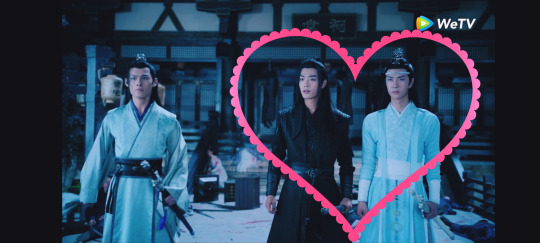
Going to draw a heart over Wangxian to keep track of every time the camera shows someone third wheeling them from now on.

Wei Ying uses his Binding/Bonding talisman on Xue Yang to show Lan Zhan it’s a dynamic tool that doesn’t deserve to be named “Boring”. Even though there’s a serial killer on the loose, Lan Zhan’s opinions on his inventions matter a lot to him. Standard Wei Ying stuff.
Wangxian’s Mirrors

At this point of the show, I could not believe there was a couple who directly mirrored Wangxian. And surprise! They were two men who dressed in black and white and came together for their common vision exactly like Wangxian did. Wei Ying cannot help but connect the dots and Lan Zhan is already aware of their eminence.
Xue Yang Fancies The Yiling Laozu
Xue Yang’s introduction makes the story take a darker turn but also a gayer one. The homoerotic subtext between him and Wei Ying literally jumps out of the screen.

(This episode had a lot of moments that were just begging for alternate dialogues to be written. I just wanted to have fun with the subtext that’s already present.)
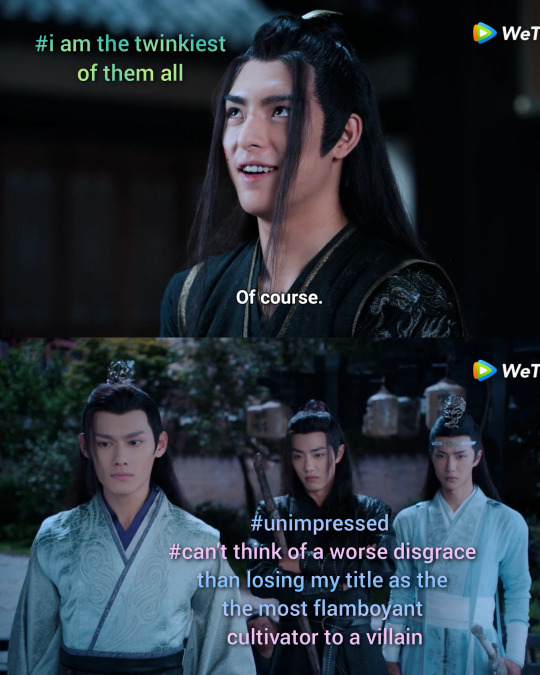
Wei Ying doesn’t want Lan Zhan to waste his precious breath interrogating the bad guy. He protectively steps up (something he does quite a lot) and puts some distance between the both of them.

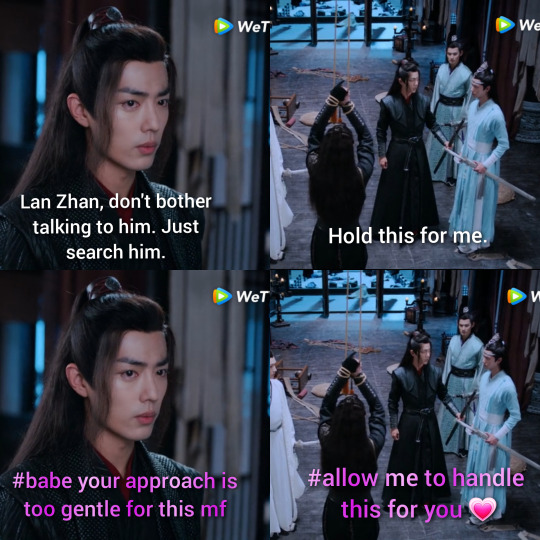
But he wants Lan Zhan to hold his sword while he does that.. and if that act wasn’t necessarily considered to be intimate or romantic before, it just became that after Lan Zhan refused to do it in front of everyone.

Wei Ying has uttered many conspicuously gay things on the show but most of them are with reference to Lan Zhan. Therefore, this is possibly the gayest dialogue he has ever said in a strictly non-Lan Zhan context.
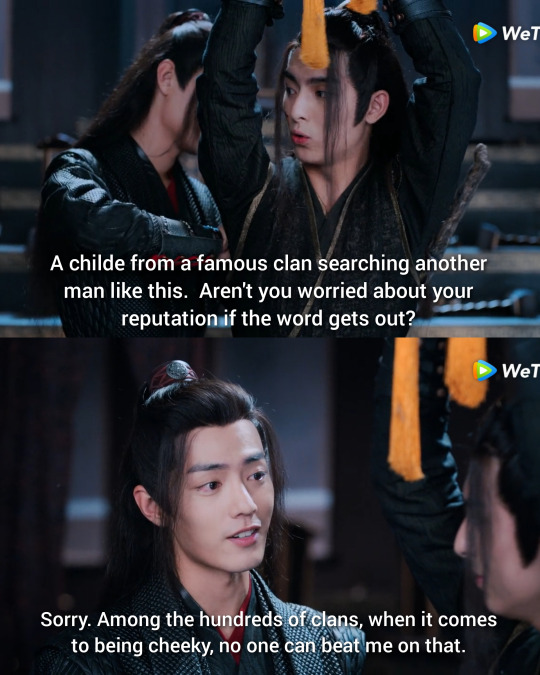
His tone is all, “Honey, you've been existing for 5 minutes, I'm the queerest person the cultivation world has seen in a millennium. You think frisking a guy is going to make me feel scandalized?” This is nuts to me because Xue Yang is arguably the most blatantly coded gay character on the show.. and here is Wei Ying all but saying he can outgay him. That he shouldn’t come after his job. And Lan Zhan just looks like..
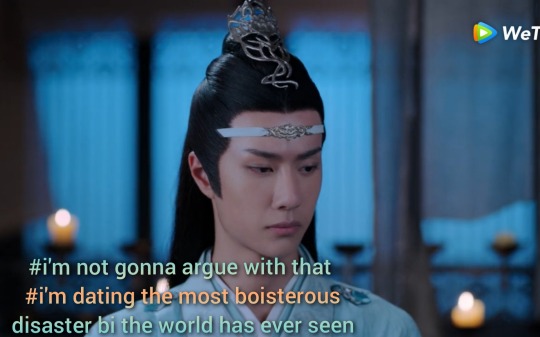
It is curious how Lan Zhan says no to something that would require Wei Ying to go near Xue Yang again.
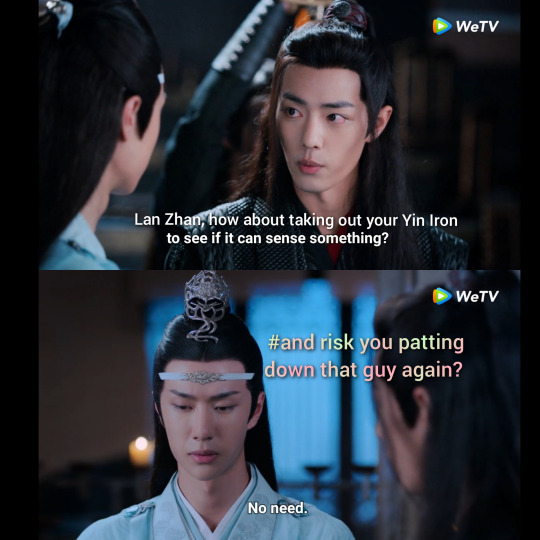
We get it, Lan Zhan. It was hard to see your guy giving attention to someone who wasn’t you.

When Lan Zhan is unsure what's happening back home, the first person his eyes seek is Wei Ying, his source of strength and reassurance.
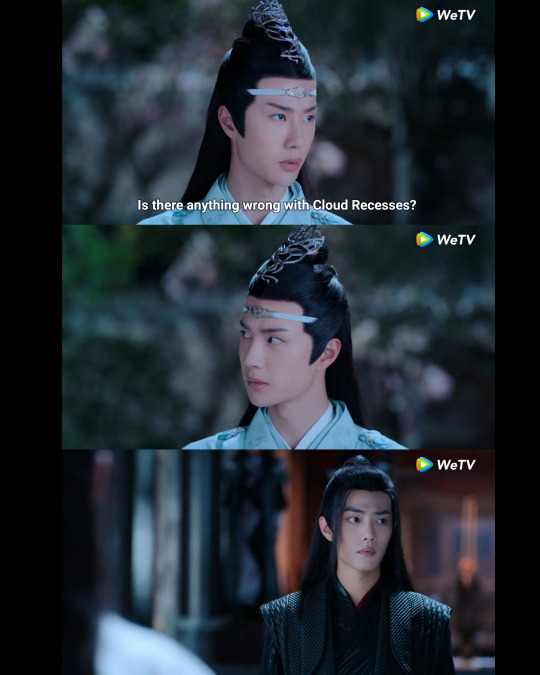
SongXiao Help WangXian Fall Deeper In Love

Wei Ying is euphoric to meet another pair of Soulmates™. (The same kind of glee that queer people feel when they meet a celebrity queer couple.) His relationship with Lan Zhan just gained supreme validation and a boost to the power of infinity!

He sees everything he has with Lan Zhan reflected in SongXiao’s relationship. He admires them and is delighted that people like them who aren’t concerned with clan drama can walk the wider path of justice, and also lead successful, honourable lives. He looks to Lan Zhan for confirmation but Lan Zhan doesn’t seem too eager to publicize the super sweet promise they made at the lantern ceremony or the fact that he’s been secretly enjoying Wei Ying’s companionship on this expedition. And let’s be honest, it would’ve been more shocking if Lan Zhan did confirm any of that here.
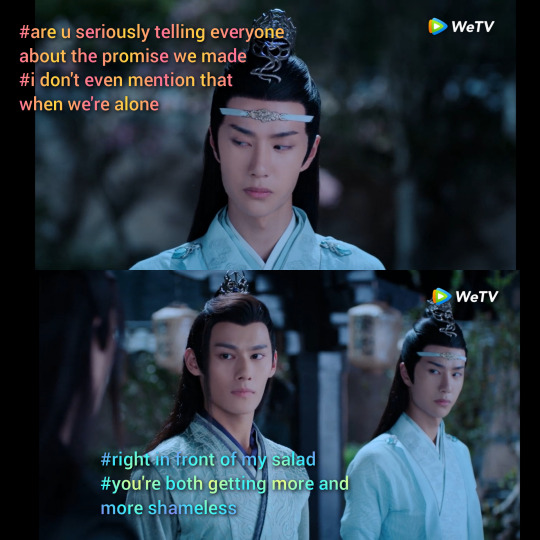
Cheer up, Wei Ying! Lan Zhan will get plenty more opportunities to prove his love for you and he'll ace every single one of them.
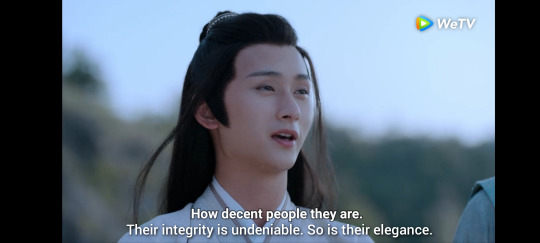
No one asked for this but thank you NHS for declaring your ideal type is beautiful gentlemen who fight crime together and unapologetically go their own way.

The parallels between the two pairs write themselves. More importantly, it is while watching SongXiao leave together that Lan Zhan stumbles onto an epiphany.
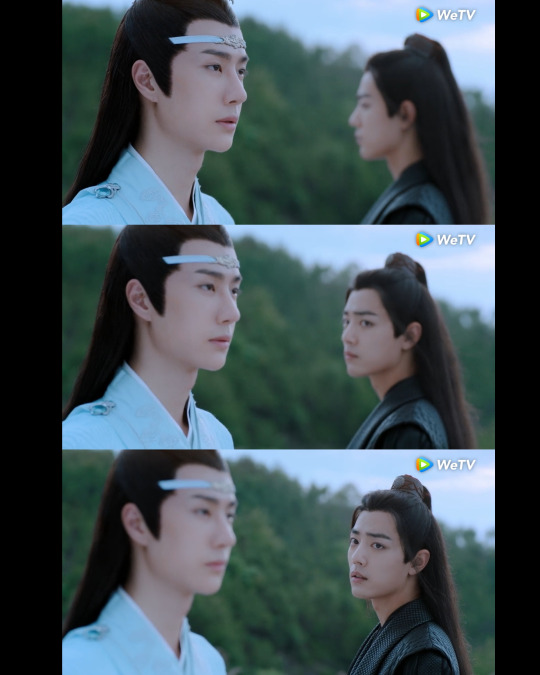

This is such an underrated moment in the show. The sorrowful music and slow-motion shot of Lan Zhan looking at Wei Ying with vulnerability all over his face once again drives it home that Wei Ying is The One for him, and he is his. He was already getting tired of denying that Wei Ying is his soulmate in every sense there is, and he feels his pain and sadness in this moment. It is enough for Jiang Cheng to feel sorry for him and move on but not for Lan Zhan who feels all that his soulmate feels.
It is overwhelming and brand new information to Lan Zhan himself that he can feel it because Wei Ying is not in impending danger right now, so this need he feels to protect him and be there for him can only mean that he loves him beyond the shadow of a doubt. Wei Ying seems upset thinking about his mother and Lan Zhan gets it, without Wei Ying having uttered a word the whole time. His face shows a kind of defeat in this scene; he surrenders to everything he has known and felt for some time now : He's in love with Wei Ying and would tear down the universe without a second thought if it means it would rid him of his unhappiness. And he isn't able to do that in this moment. But thanks to Song Lan and Xiao Xingchen, he’s found comfort in the truth they have each other at the end of the day, even if they have nothing left in this world. He cannot give back to Wei Ying what he has lost but he can accompany him in his sadness, and it will have to be enough. And it is, because Wei Ying can overcome just about everything as long as Lan Zhan walks by his side.
Wei Ying Says Lan Clan Deserves Rights
Wei Ying has many nice things to say about the Lan clan who he found exhausting a few months ago. Love brings about miraculous changes in a person, y’all.
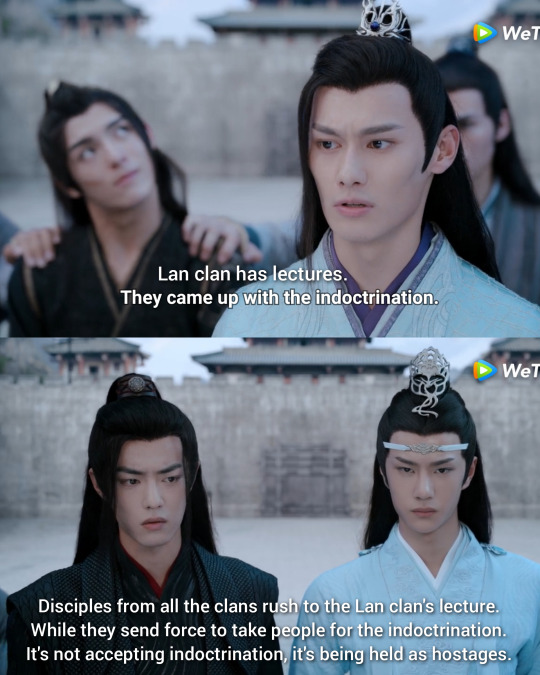
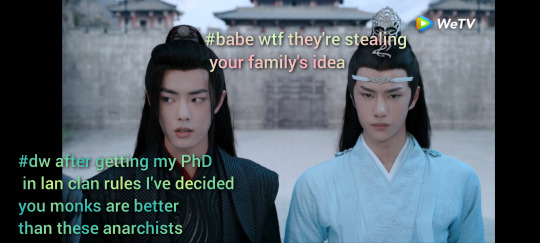
Wei Ying gravitates towards Lan Zhan as if it's second nature to him and it really is.

Jiang Cheng spends a lot of time trying to get Wei Ying to spill the Top Secrets about the Yin Iron and Wei Ying is like, "Sorry, I’m bound by the Soulmate laws to tell you absolutely nothing."

Wei Ying is already embracing the idea of controlling the Yin Iron and people are rightfully getting offended by his suggestion.

What did you expect, Wei Ying? Not everyone is your lifetime confidant to give you the benefit of the doubt and reciprocate it with compassion, trust and open-mindedness.

Wangxian’s Temporary Separation

What was that, Wei Ying? Did we hear you admit that the Gusu Lan roof is softer than the one in Qinghe? Could this have anything to do with a certain law enforcer in Cloud Recesses you fell in love with at first sword fight?
There is a delicate, bittersweet air to this separation, and even the casual watcher is going to be wondering, “When did I get so invested in Wangxian that WuJi makes me want to cry?”

It's cute how Lan Zhan is like, “Okay, I’ve seen the love of my life for one last time, I’ll quietly take my leave so he doesn’t know I was waiting for him to come back.”


Turns out, "I'll sleep on your roof tonight," is one of the most romantic things we could tell the person we love. Isn't it brilliant that just few seconds ago Wei Ying had said he will take whatever ground he finds as his home for the night, and how utterly beautiful is it to have followed it up with this dialogue? “Lan Zhan, I'll sleep on your roof tonight.” Because the world is big but my home is wherever you are. That’s where I’m happiest, I'll sleep on this rugged roof and walk through thorns if it means I get to be by your side. I won't mind it at all. And how unbelievably romantic is it that Wei Ying makes a philosophical statement about life, which ends up being about Lan Zhan?

Lan Zhan hears the implications in his voice. And he openly yearns to stay behind a little longer and commit to his memory what Wei Ying looks like when he is drunkenly proclaiming his love for him under the moonlight. It is pleasantly surprising that Lan Zhan is willing to express his emotions when he knows he is safe from Wei Ying hearing them, that he doesn't mind telling him goodbye when he thinks Wei Ying won't remember it.
But the audience can hear his voice and we are going to remember it. How, "Wei Ying, I have to go," is uttered in a cadence so sweet we did not know Lan Zhan was capable of before this. And the choice of words do not simply mean that he’s going to leave, but that he has to, and most certainly not because he wants to. And how it really means, “I’m worried about everything, but especially you, and I'm sorry I have to go. I have to trust that we'll both be okay on this path. Please know that I don't wish to leave you, and forgive me for it. Wei Ying, I love you."
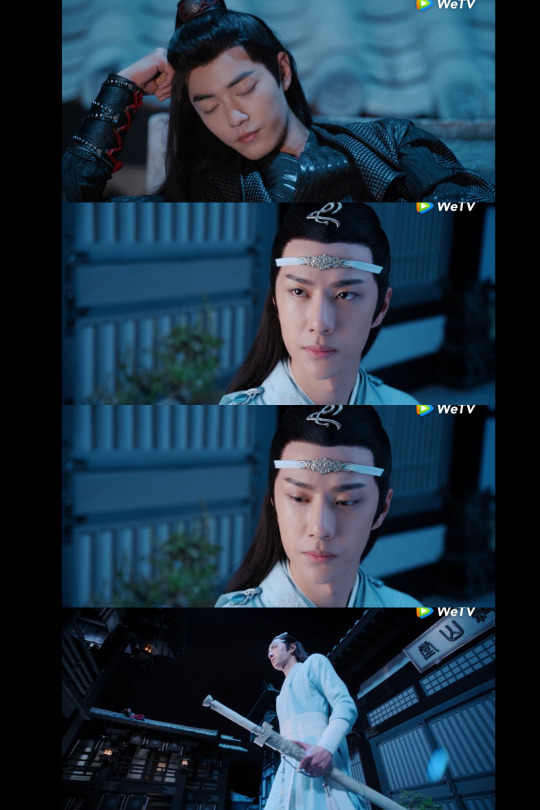
Even their temporary separation hurts so good. If they were meant to be best buddies, this scene wouldn't have been shot so poignantly. But we got used to seeing them together and every frame is designed to dig deeper into your heart and instil the fact that these soulmates are parting, and we don’t know when they’ll see each other again. This is the melancholy of a man who does not wish to be away from his lover but is forced to for the sake of the greater good. Anyone can see that.
The rooftop and moonlit night come as a callback to their first meeting, only Lan Zhan no longer wants to point the tip of his sword at Wei Ying, it gives him far greater satisfaction to place Wei Ying behind his sword.
I haven’t counted the number of times people acknowledge Wangxian’s relationship and/or know that they are inseparable, but it’s safe to say almost every character does that at some point. And some even know how to exploit their weakness, that in order to hurt one of them, the surefire way is to simply aim for the other like Wen Chao does here.
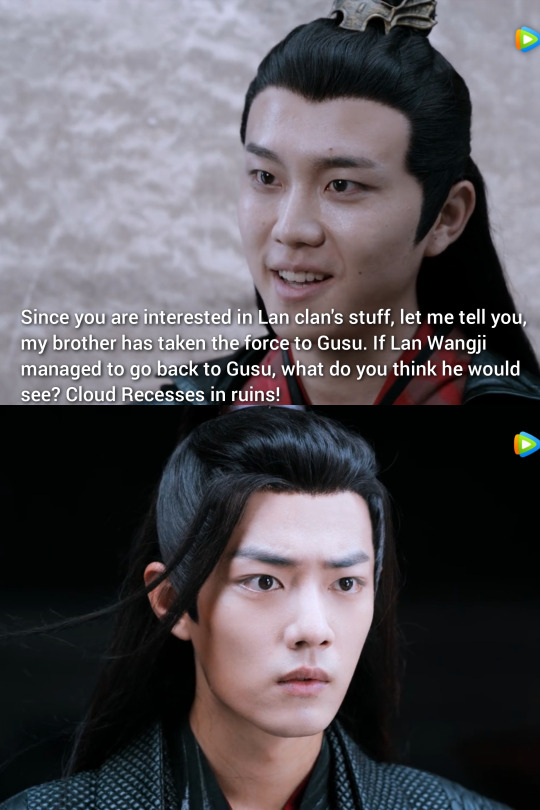
To summarize, Episode 10 saw Lan Zhan showing us his true colors : When he isn’t occupied with being the esteemed, intimidating Lan Wangji, he’s busy being a regular, sweet, romantic guy in love. And Wei Ying did that. He single-handedly exposes the soft side of Lan Zhan that nobody sees to the audience now and the world later on.
This episode also gave us this : Two soulmates chilling shoulder to shoulder zero feet apart because they’re falling in love.

#the untamed#chen qing ling#mo dao zu shi#cql#mdzs#wangxian#wangxian meta#the untamed meta#cql meta#mdzs meta#wangxiandecoded#lan wangji#wei wuxian#wei ying#lan zhan#wangxian analysis#cql analysis#the untamed analysis#the untamed rewatch#cql rewatch#cql episodes#the untamed episodes#ep10
419 notes
·
View notes
Text
So, in the wake of BeauJesters seeming passing, I’m going to take a moment to be more than a little self-indulgent and explain why I love these characters and their unique dynamic so goddamn much, as well as why I’m so disheartened by the way the show seems to be taking them. Warning: essay ahead lol. This is just a rambly rant that I’m writing because it’s cathartic to vent a little bit of frustration, and I love these characters so much. (and I love the entire cast, every goddamn one, and every other character in the show too. This is about love, not hate).
So, for a few brief and wonderful episodes in this campaign, I actually believed that I was being told a love story about falling in love with your best friend, and figuring out your sexuality, while also unlearning all of the untrue lessons that the world taught you about love while you were growing up, and in so doing, finding value in yourself. Which, for me personally, is just super relatable. Like, that ticks every damn box I have lol, which partly explains why I love BeauJester so much, and I know a lot of B/J shippers feel the same. I’ve shipped B/J from super early on, but I never in a million years really believed it would happen, for a lot of reasons. Mostly homophobia, biphobia and heteronormativity. But I enjoyed their dynamic nonetheless, even though I thought (and was often TOLD by other shippers) that it didn’t stand a chance in hell of happening.
So you can imagine how VALIDATING it was when Marisha, both in character and out of game, confirmed that Beau had very significant romantic feelings for Jester. All of the crumbs we’d collected over the course of the campaign were finally coming together and all of the gaslighters who told us we were delusional suddenly had to acknowledge that there was something there. And once it had been acknowledged, it was OBVIOUS. Omg it was so obvious and I loved every second of it. It was so undeniable for the next few episodes, and in hindsight, that there was something building there between them, there was potential. There was definitely a connection between these two characters. And for a few weeks, it was great.
Then Liam - out of character - mentions that Caleb is in love with Jester. And it is immediately, fandom wide, treated with more respect than Marisha and Beau.
I know a lot of people get very very angry when this is brought up, but it is just the ugly, unfortunate reality that a lot of people in this fandom treat Jester like a manic pixie dream girl. Even the people who do not consciously believe her to be that (and I don’t think there are many that genuinely believe it), are perfectly fine /treating her/ like one, as long as it serves one of the straight men that they love so much, usually Caleb. And this is where the heteronormativity comes in. Because even though it was an out-of-game confession with no bearing on canon, Calebs feelings immediately took precedence over Beaus in terms of the fandom narrative.
I personally have never liked the way Liam handles romance in game. He did pretty much the exact same thing in campaign 1 as well, where his sad boy pines after the happy girl from afar until he’s uncontrollably in love with her, and then with no warning he drops it like a bomb. He just happened to drop it out of game this time. The main reason I don’t like this style of romance is because of how (unintentionally) manipulative it is. You see it in bad romcoms all the time. The guy makes a public declaration of love that pressures the girl into reciprocating or looking like the bad guy. But the main reason I don’t like /this particular/ declaration is the timing.
Liam - who has always said he likes things to come out in game - inexplicably decides out of game reveal something as major as Caleb being in love with Jester, right after Marisha IN GAME took steps towards Beau and Jester being together. And it completely changed the narrative. Suddenly it was “top table top table”, and that's if Beaus feelings ever got mentioned at all. It was not at all helped by the fact that a lot of cast members (sam) still pushed Fjorester HARD, even with Jester telling Nott to stop, which must have sucked for Marisha/Beau. But even as recently as episode 99, Beau was still flirting with Jester, and there were definite hints at Jester maybe having unacknowledged feelings for Beau.
Then the hiatus happened. When we return, Beau is throwing herself at Yasha, and there’s not even a song for Jester on her playlist. And then Travis reveals (also out of game, like Liam) that Fjord has feelings for Jester (in a playlist heavily curated by known fjorester, Dani Carr). And even /that/ is treated with more weight by some fans than Beaus in canon confession. And Yasha is having all of these super convenient dreams where Zuala tells her its ok to move on, and Beau and Jester are barely speaking. And now Beau is calling Yasha her GIRLFRIEND? WHAT??? Did I miss 20 secret episodes that aired during hiatus or something???? Beau and Yasha have still, in 107 episodes, only had ONE meaningful conversation and yet their relationship is being treated as deep and inevitable. Sure, you can read into their other interactions if you want. But as a queer person, I am sick to death of my love needing to be represented as subtext.
And so it has become pretty clear that the cast has decided out of game to go in a different direction. And of course they are well within their right to do that. But I just can’t help feeling incredibly disheartened, and again, more than a little bit gas-lighted. It really does seem as if Beaus' feelings for Jester have just been scrubbed from canon - as if they never even happened. All, seemingly, to make way for a typical happy-girl-sad-guy relationship with either Fjord or Caleb, and a typical pair-the-spares barely-any-depth relationship between the two out lesbians because its easy.
For the entirety of campaign 2, BeauJester has been treated as one thing - inconvenient. Inconvenient by the fans, who prefer other ships and have treated BeauJesters terribly, and now it seems, inconvenient by the cast, who have seemingly discarded it and scrubbed it from canon.
And one thing that really upsets me is the amount of genuine viciousness and vitriol coming from (some) BeauYasha shippers. I really wish BeauYasha was something I could get on board with, I do. And a lot of people who are sending me hate seem to assume I don’t want them to end up together. But I would be fine with that. But as it stands, they’ve literally only had one real conversation in 107 episodes, and they’re calling each other girlfriend? While literally having not spoken about anything like that? While one of those characters is supposed to have canon romantic feelings for another woman? Imagine that situation with any other characters and it would be comical.
I swear, the queer ladies in this fandom have been done dirty. All of us. Imagine if, in campaign one, Grog and Keyleth, in episode 107, started calling each other boyfriend/girlfriend in the middle of a battle. (I picked those two because they probably had the fewest moments together of any VM pairing). That’s pretty much what happened here, and we’re supposed to like it - be grateful, even - because it’s wlw rep? And I swear, the number of times I’ve been called lesbophobic in the last month is absurd - all because I’m not comfortable with a canon lesbians canon feelings being swept under the rug. All because I want wlw relationships to be allowed to have the same depth and growth as the straight ones. Yes, even if that relationship is B/Y. We should not settle for less. Imagine if they had done this with any other character's canon feelings for another. People would be angry.
And I know there are going to be a lot of people saying “It’s their game, they can do what they like”.
True. I never said otherwise. But it is also a show. It is a product. They sell merch. It is something that they have taken the time and the steps to make sure that we care about. And this is what that looks like.
I know what happened here isn’t technically queerbaiting, but damn if it doesn’t cut the same.
#critical role#cr spoilers#critical role spoilers#beaujester#cr discourse#i look forward to being called toxic
190 notes
·
View notes
Note
What’s the difference between a ship that is very much “these two men are in love they’re married” and “these two are Bros for Life” broship?
Anon, that’s a very good and complex question and I’ll do my best to answer it, but I will say that this is just my viewpoint on how I approach not-obvious-or-out-from-the-get-go m/m ships. For me, the biggest factor is when the subtext breaks so far into the text that it can no longer be ignored. When a ship stops being played for laughs by the writers and is instead taken seriously. When neither guy has a serious het relationship designated as their “big romance” of the series. And when at least one of the guys in the relationship appears to be heavily bi/queer coded.
Like, a lot of early 2000’s brotps rely on the idea of “haha look at these two guys hugging and being best buds, let’s make a joke about it mirroring a real couple’s actions but make sure to keep it rooted in just friendship because again we’re playing this for laughs with the General Audience and have no intention of ever actually going there.” Think Chandler/Joey from Friends, Shawn/Gus from Psych, or JD/Turk from Scrubs. Like, Joey and Chandler have kissed in the show but it was completely obvious the ship wasn’t anywhere close to romantic canon and never would have been. They would only ever be a bromance. Overall, joke trope can be extremely frustrating not least because it’s rooted in the American cultural idea that men cannot express physical affection for one another without risking being labeled “abnormal” (intricate rituals and all that).
Additionally, in each of the bromances I mentioned above, at least one of the guys has a big romantic het love interest who’s another main cast member. That het relationship on these types of shows usually takes precedence for any and all romantic considerations, even if people prefer to watch the friendship banter (so, like, Shawn/Juliet being the popularly shipped slowburn and endgame in Psych, despite everyone knowing that Shawn’s most important relationship in the show is with Gus).
As far as queer coding is concerned, this is when enough is left unsaid or left as subtext to make the audience wonder if we’re actually seeing the full extent of a character’s identity and romantic life as it appears on screen. This was extremely prevalent when even having one lgbtq+ character on a show required a knock down drag out fight with the network (Jack from Dawson’s Creek, Willow from Buffy). Despite queer characters appearing more often in television now than in the 90’s, it’s still a fight, especially insofar as main characters (usually straight) versus side characters (more likely to be queer) are concerned. Also, most shows would rather a character simply identify as gay or straight, not bi. The bi part here is very important because while fans of popular m/m ships often see a male character as bi because of his queer coding, it’s rarely ever acknowledged by the show itself, despite authorial and/or acting hints (think Stiles from Teen Wolf, Dean from SPN, Buck from 911). Biphobia is a very real thing and it does affect the treatment of characters in show and by viewers. I’ll also just mention that Matthew Perry originally read and played Chandler as a closeted gay man, at least in the pilot, before changing that reading as the show went on- so an example of queer coding that was intended then written out rather than built upon (so the opposite of what the writers did or are doing with Dean and Buck).
Now, let’s fully consider my two favorite m/m ships that are popularly acknowledged as romantic by the fandom, despite not being canon (or having rocky canonhood) and as they relate to my rule of thumb that illustrates subtext breaking into text: Dean/Cas from Supernatural and Buck/Eddie from 911. Dean and Cas have the “romantic vibe that’s played for laughs” aspect of a bromance in Gamble’s s6, but after that their interactions are a lot less jokey and a lot more just plain romantic. Similarly with Buddie, s2’s “you two have an adorable son” is a lot more “haha” than s4 when a gay guy thinks Buck is hitting on him and turns him down. Buck was surprised but didn’t deny anything or try to bluster his way out of the scene, instead Eddie walks into frame. As far as queer coding, there are literally thousands of posts explaining how Dean is queer coded throughout the entirety of SPN and 911 has been building up something similar with Buck during its initial 4 season run. Honestly, if a show can run long enough, it’s refreshing to have a character who isn’t obviously lgbtq+ from the start get the opportunity to come out. It took 12 years, but Cas came out as gay in 15x18 and the length of having to wait for that reveal doesn’t invalidate the character’s journey in any way, rather it encourages people to understand that you can come out at any time in your life, whenever you’re ready. Love interest wise, Dean had one long term female love interest throughout the entire 15 year run of SPN and she was never a main character. Instead, his relationship with fellow main character Cas was carefully built up and tested, showing that irrefutably romantically coded relationship to be Dean’s priority. Buck was involved with a main female cast member throughout season 1 but since her departure he has had no serious love interest and instead built upon his found family- particularly as it exists with Eddie and Eddie’s son. Both these relationships read as romantic because that’s what they are. However, so long as there is resistance to letting these ships be canon or letting these characters be queer, the GA will only ever see them as bromantic substites and people will forever argue about their authenticity like trying to make a death bed love confession platonic.
Overall, Destiel and Buddie and other similar m/m ships are best described as husbands instead of “bros for life” because they’ve met the criteria of breaking out of subtext and into the show’s main story. Plots often hinge on the ups and downs of their relationship, they’re taken seriously and built up by the writers, and are obvious enough for the GA to notice and possibly ship, even if neither character is out.
47 notes
·
View notes
Text
The Allegory of the Tin Man, the Dictator, and the Knight: a Dissection of Ironqrow and a Character Arc of Failure
“There lived in the Land of Oz two queerly made men who were best of friends. They were so much happier when together that they were seldom apart.”
— L. Frank Baum
A brief Ironqrow meta and character analysis of James Ironwood, the ultimate screw up, in three parts.
I. Qrow and Ironwood’s Homoeroticism in Canon Source Material and its Translation
II. Ironwood’s Repressed Characterization and the Inherent Chivalry of the Dictatorship
III. Ironwood, Alone
Qrow and Ironwood’s Homoeroticism in Canon Source Material and its Translation
Within the Oz series, the Tin Man and the Scarecrow are layered within homoerotic subtext, even if it is included unintentionally. Tison Pugh’s analysis Queer Utopianism and Antisocial Eroticism in L. Frank Baum's Oz Series posits that the land of Oz as portrayed within the series is a largely asexual environment of suspended adolescence that involves the deviation of binary gender norms, and of performative heterosexuality. Pugh refers to it later as a “queer utopia”. Men are portrayed as a lesser military force to women, and heterosexuality is a flimsy presence at best; all signs of procreation within Oz are stifled. While this could be chalked down to Baum not wanting to get into the subject of sex and exploration in a children’s series, it does contribute to a particular tone with real-life critiques of capitalism and a particular deconstruction of gender norms. Ozma, who will become the ruler of Oz after the Wizard and the Scarecrow respectively, for example, is originally a boy named Tip (the name itself holds phallic implications) who is “transformed” into a girl. The strongest military force is one of all-women led by a rebellious female general. Pugh observes, “At the same time that Baum satirizes...women as leaders…he consistently depicts women as more successful soldiers than men, and female troops appear better capable of serving militarily than male troops…[the] male army comprises of twenty-six officers and one private, and they are all cowards…” and cites the Frogman’s declaration that “Girls are the fiercest soldiers of all...they are more brave than men, and they have better nerves”.
RWBY itself isn’t opposed to this kind of subversion, either in its characters or its relationships. There’s an obvious effort to include LGBTQ+ representation (albeit primarily in the background), strong female characters are prevalent and make up most of the main and supporting cast, a character’s gender is not strictly reliant on its source material, and BlackSun, while cute and a valid ship in its own right, is treated as a heterosexual red herring to Bumbleby. Additionally, there have been a lot of hints by the voice actors, writers, and creators on social media that Qrow himself is queer, the infamous Ironqrow embrace included.

Admittedly, if I wanted to write an essay about the likelihood of Qrow being LGBTQ+ or having some kind of queer identity, I would probably focus more on his relationship with Clover, which had a lot more overt and probably canonically intentional Gay Vibes, and despite having known Qrow nowhere near as long as Ironwood has, it has just as much, if not more, to extrapolate. Unfortunately, that’s not the main point of this essay, although it remains relevant. While I personally don’t doubt that Qrow has had sex with women or experiences valid sexual attraction to them, I get the feeling that it is, to a degree, a performative act and a masculine assertation of enjoyment intended as a coping mechanism. It plays into the trope of the handsome, tortured alcoholic (best exemplified, perhaps, in the MCU’s Tony Stark, Dean Winchester in Supernatural, and critiqued in the superhero episode of Rick and Morty) who sleeps around just to recall the feeling of intimacy, or because he associates sexual ‘degradation’ as a reflection of his worth. Real self-deprecating, slightly misogynistic stuff. Qrow’s recall of short skirts, as well as his brief exchange with the waitress in an earlier volume, reminds me of one specific interaction between the Scarecrow and his own love interest. Within the series, the Qrow’s source-material counterpart, the Scarecrow, has one canonical love interest, the Patchwork Girl:
“Forgive me for staring so rudely,” said the Scarecrow, “but you are the most beautiful sight my eyes have ever beheld.”
“That is a high compliment from one who is himself so beautiful,” murmured Scraps, casting down her suspender-button eyes by lowering her head.
Pugh points out that the two of them never develop this relationship further than flirtation, and heterosexuality is reduced to a “spectral presence” lacking the “erotic energy [driving] these queer narratives in their presence”. Specifically, Qrow never reveals a serious or long running heterosexual love interest - he is not the father! [of Ruby] (despite much speculation that he and Summer Rose were involved) and he and Winter never really moved past the stage of ‘hostility with just a hint of sexual tension’ - and there is no debunking of potential queerness. His interactions with Clover (deserving of an entire essay on its own) seem to support this interpretation, and is more or less a confirmation of some kind of queer inclination or identity. Again, the “queer utopia” of Oz comes at the cost of the expulsion of the sexual or the mere mention of reproduction - still, through this device, same-sex relationships gain a new kind of significance with the diminishing nature of heterosexuality. Speaking of queer narratives, the Scarecrow and the Tin Man have the most tender and prolonged relationship of perhaps all the characters in the series, exchanging a lifelong commitment:
“I shall return with my friend the Tin Woodman,” said the stuffed one seriously. “We have decided never to be parted in the future.”
Within the source material, the Tin Man and the Scarecrow voluntarily live together, and are life partners in nearly every sense of the word. The second book in the Oz series is The Tin Woodman of Oz. In summary, the Tin Woodman recalls that he had a fiancée before the events of the first book, forgot all about her, and now must search her out so that they can get married. Who does he ask to accompany him in this pursuit? None other than his no-homo life partner, the Scarecrow. Although this sounds like a stereotypical heteronormative storyline, “this utopian wonderland...rejects heterosexual procreation...First, the Tin Woodman does not desire...Nimmie Amee...” and even acknowledges that due to the ‘nature’ of the heart that the Wizard had given him, he is literally incapable of romantically or passionately loving or desiring Nimmie, and by extent, women in general - to me, that works perfectly as an allegory for a gay man who is literally incapable of experiencing legitimate heterosexual urges, but ‘soldiers on’ out of obligation and societally enforced chivalry. “The Tin Woodman excuses himself from the heteronormative imperative...Only his sense of masculine honor, rather than a heteronomratively masculine sex drive, impels the Tin Woodman on his quest to marry his long-lost fiancée.” Again, Ironwood’s character follows the lines of propriety within the sphere of the wealthy elite, and his persona as a high-ranking military man and politician, as well as the conservative values instilled within Atlas, prioritize duty and obligation. This kind of culture is stifling and in a lot of ways aloof, as the upper class deludes itself into believing that it is objectively better and more advanced than its neighboring territories. *ahem the myth of American exceptionalism ahem*
“There lived in the Land of Oz two queerly made men who were best of friends. They were so much happier when together that they were seldom apart.”
I think it’s funny that the characters that Ironwood and Qrow are based off of are canonically the closest of friends, who coexist almost as a unit. In contrast, the first introduction we get of Ironwood and Qrow is a hostile exchange where they’re at each other’s throats, never on the same page, and never in sync, not when it matters. Indeed, Qrow snaps at Ironwood for his lack of communication, which is a recurring issue between the two of them on notable occasions. If the source material is anything to go by, there should be a significant relationship between the two of them, or at least some kind of connection, even if it goes unspoken or unacknowledged. To be fair, in RWBY’s canon, I think there is.
I’ve seen this joke that while Qrow hates the Atlas military, the only people he really seems to flirt with is Atlas military personnel. “Ice Queen” is something I interpreted to be partially hostile, partially mocking, and partially flirtatious, in equal spades - the voice actors and creators have indicated that it was flirtatious, and there was a whole Chibi episode dedicated to the concept of Qrow and Winter’s extrapolated sexual tension, albeit in jest. I might argue that his use of abbreviates aren’t reserved for people he dislikes, but for people who bring out his playful side. “Brat”, “Pipsqueak”, “Firecracker”, and “Kiddos” are all drawn from a place of affection, however short or mocking it may seem, because that’s what crows do: they mock others.
Qrow has little nicknames for people; while it’s not exclusively a sign of affection, I do get the feeling that ‘Jimmy’ is an informality that irks Ironwood, but can also be interpreted as Qrow giving James what he needs, rather than what he wants.
Glynda is by no means a pushover, but in assuring him that while he does questionable things, he’s still a good person, she’s softening the blow and probably further enabling deeply rooted and pre-existing traits, many of which contribute to his problematic control complex. It is established early on that Qrow resents the military (as he should), and it is implied that he’s spent a fair amount of encounters harassing and provoking military personnel (Winter being the most evident example of this), and has insulted the military numerous times to Ironwood’s face. He lectures Ironwood about the way he conducts his operations, his inability to communicate, and basically what a complete, inconsiderate asshole he really is.
What Ironwood needs is someone who operates outside of the pretense that he works, breathes, and lives under, and just tells it like it is. Jimmy isn’t all that - he’s a person, just like the rest of us, and he can flaunt all the titles that he wants, but James stripped down is still just Jimmy.
Qrow also is the kind of person who pries, who is insistent, and not particularly sensitive. For someone like Ironwood who has a lot of (physical and emotional) barriers, logically, in order for him to receive genuine understanding, Qrow fits the profile of someone who is invasive but not exploitive, who sees past the cracks in his armor and takes him for what he is. What is just important is that whoever Ironwood is with is someone who makes him want to try not only to be better, but to be real; thematically, General Ironwood seems to have a great respect for but a deep struggle with authenticity. He clearly resents the ignorance and frivolity of Atlas’s wealthy elite, as evidenced by his support for Weiss at the dinner party in announcing that “she’s one of the only people making any sense around here”, while struggling to project the facade that he’s carefully created.

See, we don’t have evidence that there is something going on between Ironqood and Qrow so much as we have enough evidence to inconclusively say that there’s not not something going on. I think there’s enough evidence to support the idea that something could be going on, or was going on.
When Qrow saves Ironwood at the Battle of Beacon, who is under the false impression that Qrow believes him to be the culprit of the attacks, his eyes follow Qrow and we get a closer shot of his awed expression; we the viewer can only imagine what he sees as Qrow arcs through the air and slices down a Grimm from behind his back. The focus on Ironwood’s expression portrays something like shock (so Qrow wasn’t trying to attack me after all, but then what the hell is he doing?), maybe wonder (I can’t take my eyes off of him, I can’t look away), maybe respect (I know he’s a good Hunter, but I’ve rarely seen him in action), but it is unfiltered nonetheless. In a show where fight scenes are vital to the progression of the story itself, the dynamics of these fights are at their best when they are character driven, whether it is revealing or reinforcing something about the characters and their relationships, or it is deciding their fates. There’s something to be said about characters being given moments together in battles, and what that says about the significance of their relationship. The best example of this might be the battle between Blake and Yang vs Adam; it served to give Adam what he deserved, help Blake and Yang reach closure in certain aspects of their own trauma, and solidify the bond between the girls. Similarly, Qrow and Ironwood’s moment is meant to reveal a theme that will later be revisited in volume 7; trust. Ironwood is startled but not shocked when he believes that Qrow distrusts him to the degree of attacking him, and is ready to attack or defend as needed.
Qrow tells him what he needs to hear, more or less: YOU’RE A DUMBASS. Ironwood is, indeed, a dumbass. While he does extend the olive branch of trust and good will to CRWBY and co. this trust is highly conditional and proves to be, while from a place of desperation and sincerity, at least partially performative.
When Ironwood snaps, he snaps hard.
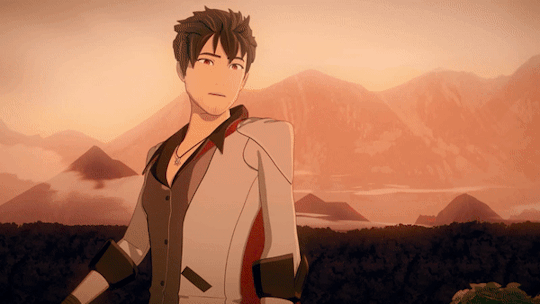
Amber’s voice actress tweeted early on, joking that Qrow has two Atlas boyfriends, and Arryn has made comments, too. It’s one of the older ships, and the crew is certainly aware of it (“...extended chest bump...”).
Kerry has stated that he finds the Ironqrow relationship interesting, and wishes it had been explored more (additionally, allegedly lobbying that Ironwood’s arm in the Ironqrow hug scene be slightly lower). I’m not saying that they’re going to both make it out alive, or canon, or even that romantic subtext was intentionally woven into the script. All I’m saying is that I think their relationship is interesting too, especially when the subtext of their source material relationship is taken into context, and the way their characters are positioned is suggestive of some sort of compatibility, even if it is a hit or miss kind of opportunity, and I have the sinking suspicion that it was missed on both accounts.
The Tin Woodman of Oz concludes,
“All this having been happily arranged, the Tin Woodman returned to his tin castle, and his chosen comrade, the Scarecrow, accompanied him on the way. The two friends were sure to pass many pleasant hours together in talking over their recent adventures, for as they neither ate nor slept they found their greatest amusement in conversation.”
Ironwood’s Repressed Characterization and the Inherent Chivalry of the Dictatorship
“I don’t give a damn about Jacque Schnee...what about the other two? Do not return to this office until you have Qrow Branwen in custody.”
“And that’s not all we’ve lost...I had Qrow in my hands, and I didn’t do what needed to be done.”
Observe: Ironwood, at this point, does not care about politics. I doubt he’s ever wanted to, or ever liked it (if his tired outburst at the dinner party is any indication) but his Knightly qualities (we’ll get to that) have, up till this point, prompted him to adhere to them for both power and etiquette. James surrounds himself in a world that he understands and despises; more than anything, he’d like to be a general, a commander, and the Knight in Shining Armor archetype, because warfare is something he understands. It is a testament to his (superhuman) willpower that he forces himself to become fluent in the language of politics, and to live and breathe in it. To clarify, Ironwood sees himself as a man who does what needs to be done; if he wants to change and control Atlas, he will have to involve himself in its politics.
Likely, his resilience has contributed to the way he views himself and what he deserves, as someone long-suffering and almost martyr-like, a silent hero doing what needs to be done. But at the moment, he’s lost his goddamn mind coming undone. He’s murdered and jailed his political dissent (and might have considered executing prisoners), but at this point, that’s all that Jacque and Robyn are to him. First he dismisses Jacque, narrows it down to the two escaped prisoners, and finally reveals what’s really on the forefront of his mind: Qrow, free and out of his hands.
[ When recalling this dialogue, please do so while imagining a bad recorder cover of the Titanic music playing over the background. Here is a sample. ]
In the most recent episode, Ironwood seems to have gone off the rails even further. The fact that Winter, his most faithful lieutenant, is losing her unshakable faith in him, says a lot about how hard he’s fallen off the deep end. In Winter’s mind, I think that she sees him almost as a surrogate father figure, or at least a patriarch who can be positively compared to Jacques in every way. The previous volumes go to lengths to compare the two as adversaries and showing James in a favorable light; Winter is in her own personal horror right now, because she is beginning to understand that Ironwood is a man who may not be her father but is just as susceptible to corruption, and may have been that kind of person all along. Skipping over the...ah, genocidal tendencies, and the fact that he’s proposing to kidnap Penny’s friends to force her to obey him and likely is starting to realize that Winter is the perfect bait (let’s just say that “Ironwood is not good with kids” is the understatement of the year) Ironwood wants Qrow back (in captivity), I think that it’s significant that while Ironwood registers that Robyn is gone as well, his first priority is Qrow, probably for two reasons. On one hand, he still refers to Qrow by his first name, instead of the formal Branwen. Of course, that doesn’t have to mean anything at all. They’re colleagues within the same age range, both members of the same secret brotherhood and similiar skill sets.

On the other hand, it reminds me of the moment when Qrow and the kids first fly into Atlas, and they see the heightened security, and Qrow mutters, “James...what have you been doing,” under his breath, sounding concerned, apprehensive. He’s not addressing the kids, he’s talking to himself; he regards James much more seriously both as a potential threat and a friend than he’d rather the other know, and I think that James’ focus on Qrow at this point is similiar, only not only is this a sign of them knowing each other well, but of Ironwood’s slipping control. He offered Qrow his trust and camaraderie, his last attempt to keep a handle on his humanity (or, his heart). Qrow, in return, withheld vital information, got close with another operative instead, then allegedly killed him and and escaped ‘rightful’ imprisonment.
The Tin Man is offering Qrow his heart, at least proof of it, and the Scarecrow [and co.] steps back to observe the situation, and assesses that no, what you are going to do is wrong, and I cannot agree with it.
Ironwood is not an objective person, as much as he wants to be. He’s angry, desperate, scared, and humiliated. Worst of all, he’s rebuffed, and he’s taking Qrow’s escape personally. First, he understands that Qrow is a threat. He’s Ozpin’s best agent, he has years of field experience, and he knows too much, probably more than James knows. Second, they have history.
My personal interpretation of Ironwood is something this:
He’s a sad, sad, lonely bitch. What Ironwood longs for, just like his source material counterpart, is a heart. He will go to any lengths to achieve this, because he believes that he has self awareness and therefore is able to check and balance himself. He treats his subordinates well, is diplomatic, skilled in a variety of trades, fighting the good fight, and longs for the affirmation that yes, he is a good person, and yes, he’s had a heart all along. He just strays from the path, and loses his way.
This is symbolically represented by his partially mechanic exoskeleton; we have no idea how far the cyborg extremities extend, or how deep, but we do get the visual notion of humanity in conflict, or a man’s soul deconstructed and split between the cold efficiency of machinery and the very real warmth of a human body. Ironwood wants to appear human, and benevolent, and genuine, and in return, loved; he is human, and he could be all of these things. If my reliance on the source material holds any merit (although I highly doubt it), then there is also a potential struggle with sexuality, (Glynda herself even explicitly and exasperatedly references a testosterone battle between Ironwood and Qrow, suggesting a regular overassertation of masculinity) and a further incentive to achieve love and subsequent acceptance.
To clarify, I do believe that there were less-than-subtle allusions to Ironwood and Glynda having a vaguely flirtatious history, taking their shared scenes and background dancing into account, but this, again, does not “debunk” the presence of queerness within a narrative; it could be an assumption of heterosexuality, or performative itself, or just not an exclusive interest. Besides, Ironwitch isn’t what this essay is about. I’m not trying to persuade or dissuade someone of the notion that Jimmy is gay, or straight, or something else, only that the potential ambiguity exists. What I do think is most important is that James doesn’t openly ward people away, not when those people aren’t under his command and are technically outside of his jurisdiction. He’s friendly with Glynda, tries to extend trust to Qrow, is kind to people in the aftermath of battle, and overall clings to diplomacy as his first weapon. He wants to be accepted, to be liked, and to be welcomed. This is not an outrageous want, nor is it uncommon. Unfortunately, Ironwood’s understanding of love and acceptance is entangled within the concept of control, and he associates unquestioned compliance with this Want.
Ironwood’s introduction into the series shows him being openly cordial, and very considerate, especially his interactions with Glynda and Ozpin. He’s a gentleman, he’s apologetic, and, as Glynda assures him, he’s a “good man”. She doesn’t really elaborate on what a “good man” is, exactly, but we might presume that a “good man” is a person with good intentions, who strives to do what’s right, regardless of his options.
Here’s the thing - one similarity between Ironwood and the Tin Man is that they both have the capacity to love, but they fool themselves into thinking that they don’t; before the Wizard gives him a ‘heart’, the Tin Man suggests that he is only kind and considerate to everyone in Oz because he believes he needs to overcompensate for what he lacks, and is therefore doubly aware of how he treats others. However, the Wizard knows no real magic, only tricks and illusions, and what he gives the Tin Man is essentially a placebo that enables the Tin Man to act towards and feel about others the exact same as he always had, only with the validation that what he feels is authentic. Similarly, Ironwood has always had the option to be empathetic and not fucking crazy open to collaboration, which he’s very aware of, until his own paranoia cuts into his rationality and compels him to cut himself off from all allies and alternative perspectives. He then uses his difficult position and responsibilities to justify unjustifiable actions, to rationalize irrational urges, and to gaslight and brainwash his subordinates into compliance.
The Tin Woodman knew very well he had no heart, and therefore he took great care never to be cruel or unkind to anything.
“You people with hearts,” he said, “have something to guide you, and need never do wrong; but I have no heart, and so I must be very careful. When Oz gives me a heart of course I needn’t mind so much.”
Qrow sees through this, however, and not only seems incapable of following orders himself, but disrupts the decorum that Ironwood is used to. In return, I think we see a little more of James that he’d like to reveal.
“If you were one of my men, I’d have you shot!”
“If I was one of your men, I’d shoot myself!”
In case this entire ass essay doesn’t make it obvious, I do really ship Ironqrow. I’m open to other pairings, definitely, but this one in particular is just more interesting to me. It feels more revealing, more subtle. I have more questions.
In hindsight, maybe the dialogue example above ^ didn’t age well, considering where they’re at, but I do like how their professional animosity is flavored with a kind of camaraderie, and understanding. This exchange isn’t exactly playful, but they’re taking each other seriously - and, like repressed schoolboys, taking the piss at each other in a childish way, and isn’t that part of the fun of banter, when they’re so focused on each other that they forget to act their age? In a lot of ways, this is a really fun dynamic to watch. They’re opposite-kind-of-people, which I like, at least on a superficial level, and I can easily imagine them tempering each other in ways that would make them ultimately happier people.
They even look well-coordinated, with similar color schemes that lean on the opposite sides of the shared spectrum (white, grays, reds and black); I think the decorative design on Qrow’s new sleeves are supposed to be more ornate simply to communicate that Qrow is committed, and willing to be sentimental, but some viewers have suggested that it resembles the pattern on James’ weapon, Due Process (the revolver is based off of the Tin Man’s pistol, although, curiously, in The Wizard of Oz, the Scarecrow was the only character to carry a pistol, and the commentaries suggest that the 2007 Tin Man miniseries was the “basis of the allusion”. Does that mean anything? I don’t know. Probably not.). Still, it raises the questions: who was in charge of designing the team’s new clothes and gear? How much input did Atlas get, and was this intentional? Personally, I think that the vine-like pattern on Qrow’s sleeves also bear a resemblance to Ozpin’s staff, a subtle reaffirmation and foreshadowing of his allegiance in contrast to Ironwood, but I digress.
They can also deliver that UST kind of banter that takes up their attention, and get up really close to each other, in each other’s faces, and just be pissed, which I think is very sexy of them, mhm. Enemies to Colleagues to Reluctant Friends to Lovers is a trope that I very much appreciate. Gaining some sort of common ground at the Battle of Beacon only to reunite, tired and battered, after the shit has already hit the fan? Slow burn kinda vibes.
That hug between them was something genuinely vulnerable and a sign of Ironwood letting his guard down because he is tired as fuck. It also was uh...kinda fruity.
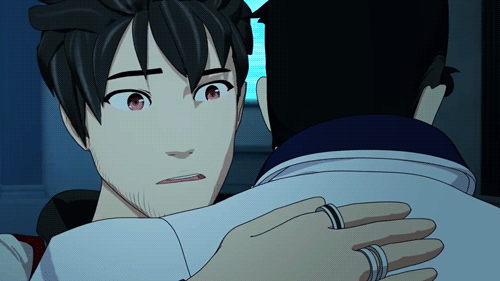
Ironwood approaches closer, and Qrow scratches the back of his head, a characteristically nervous gesture that he’s made before; it’s a nervous twitch, manufactured nonchalance. He has no idea what Ironwood wants, but he does know that Ironwood wants something. James is the one to initiate the hug, and Qrow startles and even freezes up before relaxing into it. He seems suprised, but gives the bisexual eye roll of grudging fondness. This is out of character for James - Jimmy - but Qrow doesn’t think that Ironwood is a bad person. He leans into the hug, and the camera cuts out before they separate, suggesting that they probably end up standing there for a long ass time. You can also see from the side shots that it’s a close hug; their torsos are pressed up against each other, front to front, and there’s not a lot of wiggle room. James must be really goddamn depressed. It’s a long, manly, intensley heterosexual hug. Like I said, kinda fruity.

Other people have analyzed the hug shot for shot, so I won’t get too into it, but I think that it was intentionally left as a double red herring; some people thought that maybe he bugged Qrow, and after finding out that he didn’t, we were forced to conclude that this is a genuine olive branch. To find out that Ironwood is sincere but was still susceptible to corruption is that second subversion that I didn’t really expect. I hadn’t prepared myself for it, at least, and neither did Qrow. I wouldn’t go as far to say that Ironwood’s descent into fucking craziness paranoia is triggered by Qrow not ‘reciprocating’ or something, but I do think it’s interesting how the volume opens up with a signifigant interaction between Ironwood and Qrow, only for Qrow to spend the rest of the volume homosexually bonding with Clover, while Ironwood basically has no one as emotional support (again, his subordinates do not have the power or the place to be viewed as equals and the veil of formality is one of isolation). Qrow initiates nothing further, and nothing further happens.
Ironwood’s downfall, in a thematic sense, is that what he Needs is a heart, and when he gets that chance to demonstrate tolerance and empathy, James ultimately rejects his Need (a heart) and his arc reverts into one of villainy. To be specific, Ironwood is essentially a fascist dick, and that is not very sexy. (Speaking of dicks, the thought of Ironwood’s dick makes me laugh. I bet in the RWBY universe, people have made memes about that. I do not accept criticism because I am correct. Anyway,).
Dictators are charming, charismatic, and one of the pillars of their method is absorbing potential political opponents into their own administration to reduce the threat of rebellion, to appear openly tolerant to their supporters, and to further consolidate power. A good example of this would be Mean Girls, which runs on a comedic commentary of dictatorships as a political structure of power. I hate to compare James Ironwood to Regina George, but Regina’s posse includes Karen and Gretchen, two of the only girls who might take away from the authority she holds over the rest of their school, both in their wealth and attractiveness, and Cady’s interesting backstory and conventional attractiveness is the main reason Regina draws her into her own sphere - because she detects a potential threat. Much in the same way, while Ironwood likely has good intentions, his efforts to win over team RWBY and co. - including Qrow himself - is a logical way to consolidate resources. His willingness, at first, to cooperate with political opponents (ie Robyn) is because he’s not inherently evil, and he has nothing to lose. It’s when he is openly opposed and diplomatic gestures no longer hold the necessary weight that he snaps.

In one really interesting meta about Ironqrow’s archetypes (that I reread occasionally just because I really love it), @onewomancitadel posits that Ironwood is framed within the archetype of the Knight in Shining Armor, which should inform us of the moral consistency of his character. The meta was written around the beginning of volume 7, I think, and obviously we have a lot more character development and information to go off of now, but I think she makes a really interesting point about the nature of parallels and how that might help drive Ironwood as a character. I love her analysis of the visual of Ironwood stepping out of an airship wreckage, onto the street, the smoke billowing around him to reveal his cyborg prosthetics, and of the intentional framing. Once his uniform is stripped back, we see a man who is literally half-armor, which could be indicative of a lot of things. He’s emotionally guarded, he’s used as a human weapon, and he wants to be a line of defense. In her words, “The symbolism is really obviously put into perspective of his actions in trying to do the right thing: in the flesh (his true physical self) he is literally a knight in shining armour. From the ground up. Even if it's unseen or distorted by his uniform, his nature is still true.”

While Ironwood clearly has gone down a darker path in the most recent volume, I think this analysis holds true in a crucial way. “Ironwood is working with different information, and he’s doing exactly what he knows: stick to his knightly virtues, even disgraced.” Disgraced, indeed. Ironwood is holding onto his knightly values, and doing what he believes is right. If not right, he believes that it is necessary. The problem is that these values are manifested within Atlas’s sociopolitical-military culture in an inherently toxic way - his response is, at this point, neither rational nor empathetic, but it can be explained partially due to his cultural (flawed) understanding of justice, and because of the extenuating circumstances. The harsher the conditions become, the more difficult it is for anyone to project a facade that is not sincere at its core. If James is to uphold his Knightly virtues, he needs to be a protector, a leader, and a servant all at once while operating under limited intel with dwindling trust. All he has left are the few key players still in his grasp, and the control of the people he is responsible for.
To digress: generally, knights take an oath. It could be to a King, or Lord, or some noble, but Knights are supposed to operate on a code of honor, and chivalry, and to uphold these values throughout the land as an extension of whoever they have pledged themselves to. The story of Sir Gawain and the Green Knight is a really good example of the way that, back in the day, chivalry and honor was supposed to place knights on a moral high ground compared to the common people.
In the middle of a celebration in Camelot, an obligatory tradition that has since lost real value but is rehearsed because Camelot fears that failure to uphold traditions that once had meaning is disrespectful, a Green Knight interrupts the celebrations and offers a strange challenge that boils down to a fight to the death. Gawain volunteers because accepting this challenge is what is expected of him, and Arthur would be humiliated if his knights, supposedly the best in the world, would not rise to the challenge. Gawain - and to a certain extent, the rest of Arthur’s knights - are fickle, in a sense, because their adherence to this code is performative, and it allows them to delude themselves into moral superiority and lie both to the commoners and amongst themselves; their identity as knights is based on a falsehood. Gawain is offered the first blow, and after beheading the Green newcomer, is horrified to see him become reanimated and immune to mortal blows. He invites Gawain to receive his own - likely fatal - blow, and gives him a time in which to meet, before promptly leaving.
Throughout the story, Gawain is tested in a variety of ways - in his final test, he fails, and allows his greed for self preservation and the fear of death to lead him to lie to his hosts and proceed to his meeting with the Green Knight under dishonest pretenses. While he is spared at the last second and becomes a better person (after it is revealed that Morgan le Fay orchestrated the ordeal to spook Queen Guinevere) - and by extent, a truer Knight, by the end of the story, the superficial and hypocritical nature of Arthur’s court is still in question, and still unanswered.
See, the entirety of Gawain’s trials was a test, not necessarily for him, but for Arthur and his court as a whole. Morgan wanted to prove the fickle nature of Arthur’s knights. The Knights of the Round Table were considered the best in the land, and to discredit one was to discredit all. What use is tradition if the meaning is empty, what use is chivalry if it is performed for reward instead of merit, and what use is loyalty if it is blind and unearned? Returning to Oz, the Tin Woodman, or Tin Man, grew to be made of tin because his axe became enchanted by the Wicked Witch of the East to sever his own body parts instead of the lumber he tried to cut down. A nearby tinsmith replaced each amputated limb with one of metal, until his entire body became tin and his meat body had been entirely discarded. Something to note is that Nick Chopper’s, (General Ironwood’s) wounds are technically self-inflicted. Each time he swung his axe, he made the decision to continue, knowing of the end result each time. In losing his bodily functions, the Tin Man believed that he had lost his humanity and ability to love.
The tragedy of his origin story draws a pointed correlation to Ironwood’s current dilemma; his unwillingness to stop, his self-imposed isolation, playing into the hands of the witch, and finally, the decision to let go of his ability to love remain consistent throughout both stories.
Watts even refers to Ironwood as a “Tin Solider”; a reference to the Tin (Woods)Man, no doubt, but could also evoke a soldier clanking around in metal armor. Ironwood is a Knight in Shining Armor, through and through. He wants to save the world, but at the terrible cost of civilian autonomy and possibly life. The problem is that he’s pledged himself to a discriminatory and hypocritical system, and his code is something that can easily be misconstrued by fear ( @disregardcanon ), much as Gawain’s own values. The Tin Man is, after all, still a man, and if we’ve learned anything from real fairytales, it is that men are fallible, whether or not they are made of metal.
Ironwood, Alone
he’s a lonely bitch
I know I f- up, I'm just a loser
Shouldn't be with ya, guess I'm a quitter
While you're out there drinkin', I'm just here thinkin'
'Bout where I should've been
I've been lonely, mm, ah, yeah
— Benee, Supalonely (2019)
You do get the sense that Ironwood is riddled with self-loathing conflicting with pride, with self-doubt clashing with competence, and that he is the kind of person who longs for things without verbalizing. Maybe his dad never paid enough attention to him as a kid. Maybe he suffered some terrible physical and emotional trauma, which might as well be assumed, given the extensive nature of his cybernetic limbs. Maybe (probably) he’d be more well-adjusted and would’ve made better decisions if the people around him trusted him and were a little more open. To be fair, though, he is the one at the wheel, and he is making the calls; no one else is to blame for his mistakes, and to pretend otherwise is to deny him accountability. I think we do enough of that in everyday life, in excusing powerful men of their responsibilities. To his credit, I do think he wants to help people. I think James also wants to project the personality of a leader who is stoic, controlled, and measured. He is charming when he wants to be, sympathetic when it suits him, and influential in just the right areas. He is not a sociopath, but he is a politician, and in a lot of ways, those are the same thing. We see in his brief flashes of temper, often prompted by Qrow, or most notably by Oscar, that this is not a calm, stable person. This is someone is on the verge of exploding, who is so fucking angry that he is not in control that it’s killing him, and so he is going to lash out and kill the things that are not within his grip. If the people beneath him will not reciprocate the heart that he offers, then he has no real use of it. James Ironwood does not begin this story as a bad person. This is a tragedy, in however many parts it takes.
I read, in one very smart and very put-together analysis that I cannot find and properly credit at the moment, that part of Ironwood’s (many) failures can be seen in Winter, and how, like Ozpin, he has appointed a woman as his talented, no-nonsense, second chain in command at his right hand. In this way, Winter is an intentional parallel to Glynda, who is, without question, a bad bitch. In theory, surrounding yourself with strong individuals is a demonstration of self restraint, in implementing your own checks and balances. James wants to project that he is powerful, yes, but he is reasonable.
I take this to mean that, to some degree, even if it’s unintentional or subconscious, Winter serves to boost Ironwood’s ego.

The issue with this is that within the inherently hierarchical structure of the military, Winter cannot question, undermine, or challenge Ironwood in a way that is particularly meaningful and their relationship is one of commander and subordinate before colleagues or equals (link to a fantastic post about Winter’s role as the Good, Conscientious Soldier by @fishyfod). Whereas Glynda is free to argue with, converse, and be as combative as she needs to be with Ozpin (although their power dynamic is arguably one of commander and subordinate albeit informally), Winter cannot temper Ironwood effectively, and through the illusion of equality, Ironwood is further isolated.
His head and arms and legs were jointed upon his body, but he stood perfectly motionless, as if he could not stir at all.
Dorothy looked at him in amazement, and so did the Scarecrow, while Toto barked sharply and made a snap at the tin legs, which hurt his teeth.
“Did you groan?” asked Dorothy.
“Yes,” answered the tin man, “I did. I’ve been groaning for more than a year, and no one has ever heard me before or come to help me.”
The Tin Man needs oil to lubricate his joints; without it, he cannot move, and he is rendered helpless and inanimate. When Dorothy and the group find him, he is entirely isolated with no one in sight, and he has been there for such a long time that he has begun to rust. Similarly, Ironwood needs valued voices of dissent to keep him in check. His colleagues were able to serve that purpose in the beginning, and out of them, Qrow is the best example of someone who doesn't take his shit, openly questions him, and looks down on the performative decorum of the military culture that Ironwood is surrounded by. What Ironwood needs is to be flexible and adaptable; his Semblance, Mettle (heh, metal, very nice pun, RoosterTeeth), is a double edged sword in that it gives him supernatural focus and willpower - enough, perhaps, to flay/chop off your own limbs - but it blindsides him, and is only further prolonging his pain.
There is a lot of sympathy to Ironwood’s character, as much as I’ve ragged on him for being an authoritarian, kind of a dick, and bad with kids. There are moments, such as the previously mentioned dinner party, where he shows his colors a bit, and when he assures the students at the Vytal Festival that there’s no shame in leaving before the battle begins, and in giving Yang a prosthetic arm before her father even has to ask. As far as Generals go, it seems that he’s seen soldiers come and go and understands, at least in his best moments, that not everyone is the same, and not everyone has power of unflinching determination to rely on. Ironwood performs his best when he tempers himself because he understands himself, and others. It’s when he fails to self-reflect that his hypocrisy shows through. Glynda points it out, too, as does Qrow; Ironwood advocates for trust but often fails to give it himself, going behind Ozpin’s back, being absolutely shit at field communication, and now the whole fascist, borderline-genocidal keruffle he’s gotten himself into.
I think that Ironwood reaching out to Qrow was his ethical last stand, his last chance and conscious effort to choose the right path. Qrow is unequivocally an equal, not like how Ozpin is the Big Boss, the authority that James becomes disillusioned with and tries to overthrow. He wants someone to trust, desperately so, and Qrow wants that too, but narrative subversion has hands. The Scarecrow and the Tin Man have no brain and heart respectively, and are in need of them. As it turns out, Qrow is actually a pragmatic guy with solid principles angled against authoritarianism, and Ironwood is a dick who would rather enforce martial law than to empathize and tame his military-shaped boner for one second.
I might conclude that someone like Qrow might be best for Ironwood, but that does not mean that someone like Ironwood would be the best for Qrow. Qrow has a brain after all, but Ironwood does not choose his heart when it matters, case in point. Even the intro of the current season features Salem and Ironwood on a chessboard; his white pieces are disappearing, dissolving into dust, as hers transform into Grimm. Ironwood is isolating himself by depleting himself of allies. As this post by @hadesisqueer points out, Ironwood isn’t even positioned as King, the supposed commander, but the Queen, the most versatile player on the board that is so far underused, since he hasn’t moved from his spot. Ironwood’s refusal to unify against Salem is his failure to strategically utilize the best resources that were available to him; soon, the pieces will be swallowed by the dark.
James is guilty of something that a lot of us are guilty of: doing a Bad Thing for what we have convinced ourselves is a Good Reason, when in reality, it is actually a lot of Very Bad Reasons. James Ironwood is a Knight archetype, through and through, and he is charging forward to do the right thing. He is afraid, he is lying to himself, and he will never surrender.
“All the same,” said the Scarecrow, “I shall ask for brains instead of a heart; for a fool would not know what to do with a heart if he had one.”
“I shall take the heart,” returned the Tin Woodman; “for brains do not make one happy, and happiness is the best thing in the world.”
Dorothy did not say anything, for she was puzzled to know which of her two friends was right, and she decided if she could only get back to Kansas and Aunt Em, it did not matter so much whether the Woodman had no brains and the Scarecrow no heart, or each got what he wanted.
The lesson of James Ironwood is a lesson of failure, and of the way that we succumb to fear, because that is Salem’s agenda, really, in the end: fear. It’s the negative emotions, fear being first and foremost, that draw in and empower the Grimm, and it’s fear and uncertainty that causes chaos. It is when Dorothy’s friends give into their fear that they are truly defeated. FDR’s assertion that “The only thing to fear is fear itself” holds true here; it’s not so much that these characters are afraid of losing their lives, their loved ones, and of the dark, but that they do not have the love or the resources to be brave for themselves or for others.
Qrow as a character is introduced as one who is already defeated, in a sense. Half of his team is gone, dead or estranged, he’s forced into the shadows of espionage to protect a world he knows is darker than it should be, and he’s fighting a losing battle with alcoholism. As charismatic as he’s written, he’s referred to as a “dusty old crow”, a hunter of renowned skill but past the prime of his life.
Dorothy’s three titular companions are defined by what they lack; in the same vein of the Disney I Want song (a main character’s main monologue song in which their wants and desires that motivate them throughout the rest of the film is laid out in song; ie Part of Your World, Reflections, How Far I’ll Go), the Lion, Tin Man, and the Scarecrow want bravery, a heart, and a brain respectively. RWBY relies on flipping the script of its characters based on what the audience might expect from the source material; Ruby is not just a helpless little girl - her introduction is a badass with a scythe. The Scarecrow is a chronic alchoholic. Cinderella is a victim of abuse, and is also a villain who wants to set the world aflame. Subversion, subversion, subversion.
There are obviously parallels between the characters in RWBY and in their own fairytales to keep them in character, and part of the fun is spotting those clues and occasionally connecting the dots to anticipate the direction of the narrative and certain connections between characters and the significance of their arcs. While I’m not aware of Dorothy Gale’s RWBY counterpart, if she has already been established or is yet to be introduced, I don’t think it’s unreasonable to assume that Ruby has adopted a Dorothy-eque persona and can act as a surrogate in a way. She begins as a sweet, naive child eager to join a world of color and excitement, who initially believes that she has “normal knees” and is thrust into a political scheme full of powerful and older players. She even has a small dog as a companion, Toto Zwei, who seems like an odd addition, since he’s usually sidelined and basically forgotten about except in a few spare moments, unless he’s there to draw further comparisons to Dorothy. She may not be from Kansas, but she is first helped by Glynda (the Good Witch), and later expects assistance from Ozpin, Qrow, and the later Ozian counterparts. I find it a peculiar detail that for Ruby to be Little Red Riding Hood alone, she is surrounded specifically by Dorothy’s companions. This, of course, only increases the importance of the relevance of the Oz series in particular and the characters that are borrowed.
In the case of Ozpin’s inner circle, Dorothy’s closest comrades (sans Toto) differ in crucial ways to their source material. (After finishing this essay, I found a much better, condensed explanation by @neopoliitan )
Disillusioned by the Ozpin, the Wizard (who has been projecting an illusion of a failsafe) and overwhelmed by the rise of the Wicked Witch of the West, Lionhart (the Lion), gives into his cowardice and ultimately forgoes the arc and redemption of his character from the source material; as such, he is by all definitions, a failure and a premonition, as Ironwood eventually follows. If RWBY is a dark take on classic fairytales, then it is only fitting that these characters are charred husks of their fairytale selves - these are people, and some people are selfish, scared, and cowardly, and they do not overcome these traits.

This is all opinion based, pure speculation. I have no idea what will happen in the next episode, and whatever goes down will be...shit will hit the fan. I’m under no delusions that Ironqrow is going to be canon in a healthy, tender, endgame sense. They’re both kind of losing their minds, and Ironwood is shitting absolute bricks. No, they’re going to try to kill each other, and I personally cannot wait for Qrow to cleave this man in two. (Not sexually, just, literally. Like, with a scythe.)
On that note, I think that the RWBY writers are good at callbacks, at drawing attention to their own connections, and if Ironwood and Qrow’s inevitable confrontation is scheduled, then it will include visual callbacks to Qrow saving James at Beacon, maybe shot for shot. Their visuals have only gotten better as time goes on, and I imagine Ironwood’s eyes widening as Qrow leaps through the air, scythe drawn, in recal of a moment so long ago when they weren’t on the same page, but they were at least on the same side. When Qrow brings the blade down, there will be no enemy behind him. Only Jimmy James. The difference between the two of them will be that Qrow isn’t fighting out of fear, but out of love, for what happened to Clover, and to what could happen to his girls.
Qrow’s reliance on alcohol, as well as his (mostly) feigned nonchalance is meant to fit with the motif that the Scarecrow has no brain, and, had he a mind to desire anything, would desire it most of all. His role is, also, notably, gathering intelligence for Ozpin (his character is also based on Munnin from Norse mythology). There is so much about Qrow that is an act and so much that is not, and I think that this act is born both from this motif and from his own cynicism, and the alcohol contributes to this act. However, he eventually gets sober after Ruby expresses legitimate frustration, and he understands that he’s putting their lives at risk. While one could say that he gave up drinking for the kids, I would argue that the kids - Ruby in particular - made him want to give up drinking for himself, to better himself.
While Lionhart and Ironwood betray the people depending on them, Qrow’s love for his nieces (and for the kids) allows him to deviate from this pattern. The answer to fear is perhaps not merely bravery - Qrow’s triumph is love.
Ironwood knows triumph in the context of a military state, but he’s backed himself into a corner. Soon he will find himself alone and friendless. Hopefully, his last stand will not be in vain.
#ironqrow#james ironwood#qrow branwen#rwby#rwby8 spoilers#rwby volume 8#rwby meta#ok this is all just based on my opinion ok#like i ship ironqrow but ironwood is a dicktator if u know what i mean#he is probably gonna die but anyway#ironqrow meta#winter schnee#snowbird#also includes links and credit to other posts and metas#I just had to get this off of my chest ok
38 notes
·
View notes
Text
I finished The Irregulars earlier this week and i was going to do a scattered, flippant bullet point “review” as i often do, but after stewing in my feelings about it for a few days i want to talk about this properly, actually.
Something I absolutely adored was the way people’s powers manifested / the way their monstrosity was directly connected to the monstrous things that had happened to them. The concept is that a rip has opened in the universe, which allows something to extend its power into our world. This power grants people supernatural abilities when they seek help by praying/asking spirit boards for guidance/seances etc. The in-world explanation for this is that the rip takes the darkest parts of people and brings those parts to the fore, thus making them do monstrous things.
(I did feel like the show sometimes contradicted itself, one minute saying that when someone is made into a monster by the cruelty of the world they ought to be met with compassion, the next minute killing off these sympathetic monsters or subjecting them to cruel fates. The fact that Arthur Hilton, a man whose grief and trauma over the deaths of his wife and child drove him to abduct babies, was locked up in Bedlam in a windowless cell left a nasty taste in my mouth. I understand that they needed to have him there for Narrative Purposes, but after using the episode’s climax moment to reveal that this man is suffering – basically to tell us that he isn’t a monster, but someone who needs help – it felt very cheap to use him as a pawn for the plot instead of further exploring that sentiment.)
I’m a HUGE fan of the way the powers reflected the wielder, i.e., Clara (Ep. 4) was sexually abused and given syphilis, which took away her ability to have children. We learn as the episode unfolds that she’s obsessed with the idea of a family because she never had one of her own, and makes little taxidermy family scenes with dead animals. The syphilis made her hate herself and her own skin, so the rip granted her the ability to literally steal people’s faces and become them – an ability she then used to kill the men who abused her with the final goal of assuming the last man’s identity because he had a family. It was a really haunting exploration of monstrosity / what makes us monsters, and it made me go a bit feral with appreciation.
But when the credits of the last episode rolled, I just felt... dissatisfied. I was bitter at how although the casting was supposedly colour-blind, the main villain was a black man and the one “sympathetic monster” who gets killed off (Jean Gates / the Tooth Fairy) was a black woman, both with very dark skin. John Watson, meanwhile, is portrayed by a lighter-skinned POC and although he’s written as cruel, aggressive and threatening, he’s given the chance for a redemption while the Linen Man and Jean Gates get killed off. I’m not entirely comfortable talking about this aspect because i’m white and still very much learning about racist and colourist tropes, but I just kept thinking about the colourism and implicit bias in Bridgerton, and couldn’t help but feel that The Irregulars had fallen into the same or a similar trap? (If anyone has any more thoughts on this I’m happy to listen!)
I didn’t like the fact that the writers decided to acknowledge the homoerotic subtext in ACD’s Holmes canon by making John Watson manipulative and controlling, then justifying that as an act of his (unrequited) love for Sherlock. Like, it wouldn’t be so bad if there were other examples of queer love in the series (save for the one f/f couple at a fancy rich party), but when your only explicitly mlm named character is miserable, alone and pining for an oblivious/uninterested love interest – a love interest who is killed off, may I add – it’s Not Fun. Queer rep doesn’t have to be good and pure or whatever (NBC’s Hannibal, anyone?), but sure would be nice to have some positive representation first! It also seemed to me that John’s redemption was directly tied to him giving up his love for Sherlock, which I was in two minds about. On the one hand, it could be seen as him realising his love had become something deeply toxic and so he had to let Sherlock go (and that really excites me! Complex and angsty relationships are most delicious), but on the other hand it got very close to a Bury Your Gays moment so my feelings the entire time were just :/
Lastly I was super excited about Leopold because disabled character! But it seemed as if his disability just got put to one side unless it was relevant to character arcs and/or plot moments. His leg is absolutely fucked up from the first episode, but he abandons his cane? I did really appreciate the whole “you’re not broken” angle they took, though. I think it was a genuinely good-faith representation, it just didn’t quite hit the mark (which is how I felt about a lot of things in the show tbh, so... :shrugs:)
To conclude this wall of text: monsters and the takes on monsters were very tasty, and the supernatural elements and worldbuilding filled me with glee; other bits like representation and narrative choices were dissatisfying. i am now tired and out of spoons, will probably come back and clarify this tomorrow.
#the irregulars#i uhhh idk what tag to sort this into#the hyperfixations tag#monsters & monstrosities
20 notes
·
View notes
Note
You made a tag comment about how Buddie wasn't planned from the beginning. And therefore what we got in Season 2 wasn't (at the time) the groundwork for a love story. I agree completely! Much of it I can see as either a bit of fun (the Christmas elf, the instagram girl) or that kind of hyper-masc heterosexuality that loops around itself and becomes gay (Buck's whole...thing with Eddie in the beginning, the focus on Eddie's body/hotness/physical appearance). But sometimes I step back and look at the whole and I'm all 🧐 🤔.
I don't even know what I'm asking lol. Would just love your thoughts/feelings on the confusing spectacle that are Buck and Eddie in season 2. And when/how/why did the show change their mind?
Thank you so much for the ask and you know what? Let’s talk about it.I recently had an in depth chat about this pretty unpopular opinion with a friend and I tried to explain to her why I don't see buddie as an actual pairing or having any canon potential until early s3 and why I don't believe they were planned from the beginning.This will be long and all over the place of course lol
The first and the most obvious reason is the way 911 deals with main characters and their romantic arcs.They don't actually drag it on for long because there is no need or time for that since every single main character has a strong storyline of their own and any romantic development between any pair as an additional combined storyline. Relationships happen fast on 911 because they are planned ahead and the only relationship that took longer than usual few episodes was Chim and Maddie and they were already kissing and planning a date in 2x11.
Also when shows enter their second season there is never a way to predict how long it will stay on the air and because of that it is impossible for me to believe that buddie was planned as some epic old school slowburn that is nowhere as close to be resolved after 3 seasons.When I say old school slowburn I mean shows that have this one heterosexual romance at the center of the universe that is usually stretched across seasons and builds up sexual tension between characters and it takes literally years for them to finally get together.We have these two characters that where made for each other and you KNOW that they will eventually get together because of some ridiculous pining that will eventually end in a kiss and everyone will scream and cry.And maybe that’s how buddie feels to me now after years of careful build up-but the way I see it they as a potential something didn't happen in s2.
We all joke about how character introduction of Eddie is the gayest we have ever seen and Buck's reaction to him as true bisexual and I do that myself too because I am a bisexual too and tbh its hard to unsee (also I don't want to) but lets remove our rainbow glasses for a second. What really did happened in that scene? Eddie's perfect abs on display,Chim and Hen fun comments on how beautiful he is,Bobby's praise and bragging about getting Eddie and his Silver Star on the team and Buck's insecurities flaring up as a reaction to all of this.Buck immediately feels threatened.At this point we of course have no idea how deeply his insecurities run or why,but as episode progresses we witness Eddie on his first call making a better decision to how to handle a medical situation and backed up by Bobby.It has sort of a devastating effect on Buck,who suddenly starts acting like we have never seen him before.Then there is a that scene at the gym where Buck tells Eddie how he is his problem. And later we of course have the scene in ambulance when Eddie asked what exactly they are measuring. Because that's what it looked like - a usual macho men measuring context. But the thing is 911 doesn’t toxic masculinity when it comes to main male characters and we saw many examples of that already by then,but the biggest one was supposed to be BuckandEddie. Equals,partners and best friends.
911 was already pushing boundaries with cast,characters and relationships diversity and I strongly believe that what they wanted to show us was a male equivalent of what we are used to see in female bffs -a different kind of a friendship between men. Men who care about each other,who talk about feelings,discuss sex,dating or why they don’t,who again openly acknowledge that they find each other attractive and giving advices on how to take a more flattering selfie,who are not afraid of crying, admit they are struggling or heartbroken or loving their kid.Honestly when was the last time any of us saw a male friendship like theirs?Men are not allowed to be like that on TV (I am still shocked that its a Fox show tbh) and especially with each other.We are not used to see such a development so no wonder people started paying attention-which was what writers wanted,of course.
But that also brings us to that important question about queer undertones,subtext and do what we actually see in s2. Are there queer undertones?Absolutely. Subtext?It’s right there but you will probably not get it unless you’re reading between the lines.Before we get to Christmas Elf,there was ‘’He is cute!/He gets that a lot,you should’ve seen his kid...’’ Maddie and Buck scene that is once again reinforces that Buck finds Eddie attractive and it shouldn’t be a surprise because we already know from 2x01 he has eyes - but they mention it AGAIN and that personally made me raise a brow or two.By the time we get to that Christmas episode,we already have Shannon back and Buck finally moved on from Abby with Taylor and then Ali and then we are given another queer coded scene-with Christmas elf.And its very cute and to an average heterosexual viewer its a nice little joke,but any queer watching that scene was probably taken aback a little.
So why imo did Tim&Co do it and when they realized they can actually see where they can take BuckandEddie and when they started becoming buddie?My answer is ship teasing.It’s what a lot of people actually mistake for queer baiting,but we are not talking about that rn.Ship teasing works like charm and if shows can get away with that-they will totally use it to their advantage.It’s usually not always malicious,but it IS always intentional because that brings in a category of people that were overlooked for a long time-online fandom.Now I have seen some opinions that fandom doesn’t really matter,it’s the ratings that count and that is NOT TRUE.You can have your ratings,but if there is no buzz online?Your show is going nowhere.For at least a decade now every self-respecting production has teams to monitor fandom activities because it gives them better ideas about how consumers(fans) are interacting with their product (show).Fandom is important because we generate the buzz.So I do believe that BuckandEddie and that sweet ship teasing were to get a certain part of the fandom pay attention.
I wasn’t here when S2 aired so I don’t know if that was the case,but it is obvious that these scenes I talked about above made fans pay a LOT of attention. And maybe that was the reaction writers needed to start changing course from ship teasing to start building up to something else.They maybe didn’t plan it at the very beginning and on paper,but lets also not forget the insane chemistry between Oilver and Ryan,which imo is another big reason-it's impossible to ignore.
Because S3?Is light years away from S2 in terms of BuckandEddie-they became buddie.In s3 Buck and Eddie become each other’s significant other,they are in a primary relationship. ’’Buck invites Eddie...’’?!!!!! It is not yet romantic and probably won’t be until ending of s5 if we are lucky-but it is in your face,they are not subtle anymore.I personally saw buddie only at the end of 3x03 when Eddie came over and said that there is noone in the world he trusts with his son more than Buck, looking like he did into Buck’s eyes,while ‘Photograph’ played in the background right before Buck’s overvoice about being seen and found and a raft to bring one home. After S4 ending tho...we all know that something is about to happen and its like there is electricity in the air as we are waiting for s5!
Probably a lot more thoughts than you expected,but I have many feelings about these two and when buddie goes canon this post will become completely irrelevant lol 💖
#what i was trying to say#is that s2 still can be read as heterosexual#but s3? no way#s3 was different#it was impossible to ignore that something is going on#911#buddie
12 notes
·
View notes
Text
Queering KH: Part 2
How to Queer this Anime Game? By me, an American nerd lol
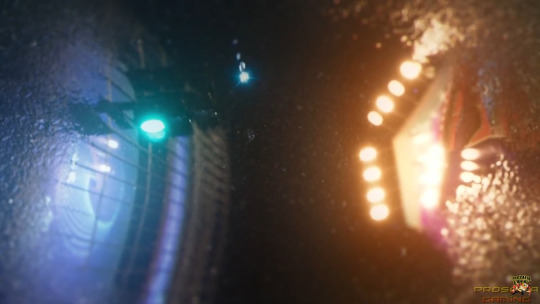
Pictured: Dream. Drop. Distance. Sequel. 8)))
What is Queering
I’m so excited to talk about this okay this is literally the only fun thing I get to do as an English major anymore lmao.
“Queering a text” is the academic term for taking a given text and extracting the queer subtext of it, or applying a queer reading to it. It is taking a piece of literature, film, or art and reading into it for the gay coding. It is an especially important tool for reading old literature written during periods of extreme homosexual oppression, wherein the author would be forced to hide hints of homosexuality under layers and layers of superficial text.
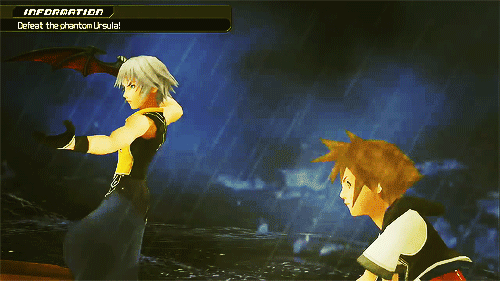
Pictured: Sora and Riku battling Ursula as she means to wreck their ship, mirroring the disaster that Sora’s friends Eric and Ariel (lovers) faced at sea.
As a post-structuralist, I am also here to inform you that every text is made up of intertextual influence. This means whether the JK Rowlings of the world intended it or not, their characters may well be queer coded because of the unconscious influence of homoerotic customs in our culture that have permeated the text. It’s why people speculated that Newt Scamander was gay, because he showed little interest in Tina and preferred to focus on his beasts, which is not normative for a male protagonist in straight media. People likewise considered that Merida from Pixar’s Brave might be gay, because she had no interest in dating men and wanted to live a wild lifestyle traditionally associated with masuculinity, things that are pretty in line with lesbian coding. And let me tell you, lgbt claimed Queen Elsa IMMEDIATELY for very good reason. Pretty much everything about her journey, purposefully or not, makes for an strikingly overt gay metaphor. Let it Go is a coming out song for a woman suffocating under normativity all her life, deal with it.
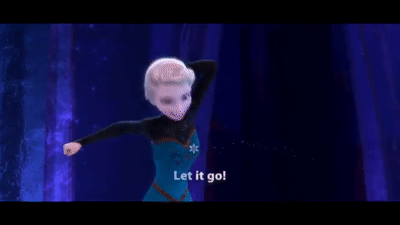
Same, Elsa.
Oh whoops I accidentally pasted this picture of Riku here.
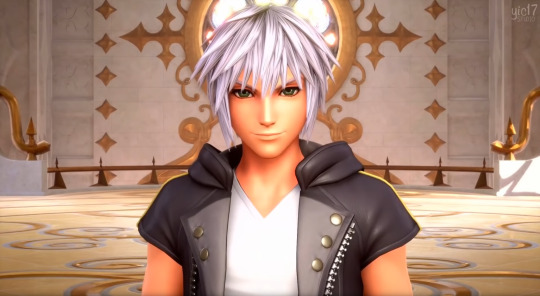
Keep Cultural Distinctions in Mind
Something else important I want to point out is that different cultures are- different lol. They are going to vary. What is queer coding here is not necessarily queer coding in Japan. A man presenting femininely in American media would certainly get him coded as gay. A bishonen in an anime though? Not so much. Men bathing together in Japan is common practice so that would mean nothing gay over there. In America however, you have things like this vine.
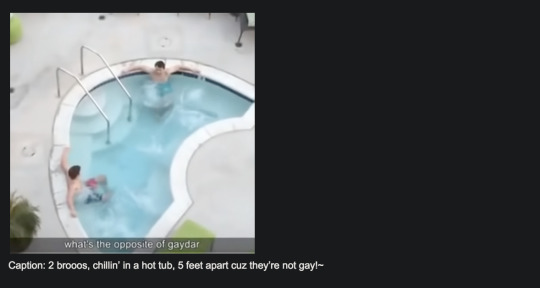
In which 2 dudes are chilling as far away as possible from each other in a hot tub to prove they are not gay lol.
So when I say the male members of Organization XIII bathe together, it means literally nothing in a Japanese context.
But let me tell you this: homosexual mlm tend to enjoy bathing with other dudes. Sexual attraction is sexual attraction no matter where you go. So how would you queer code a Japanese character as gay in a hot tub context?
By American logic, if the straight thing to do is sit 5 feet apart in a hot tub, then the inverse, the gay thing to do, would be 2 men sitting very close together in a hot tub. So if I were to code 2 American male characters as gay in a hot tub context, that is what I would do. But if I really wanted to hammer it home, I would ALSO have them blushing so there is no straight explanation for their closeness.
And for a Japanese character, for whom bathing with men might well mean nothing, I’d definitely have them physically blush, so that you know it does NOT just “mean nothing” to him...
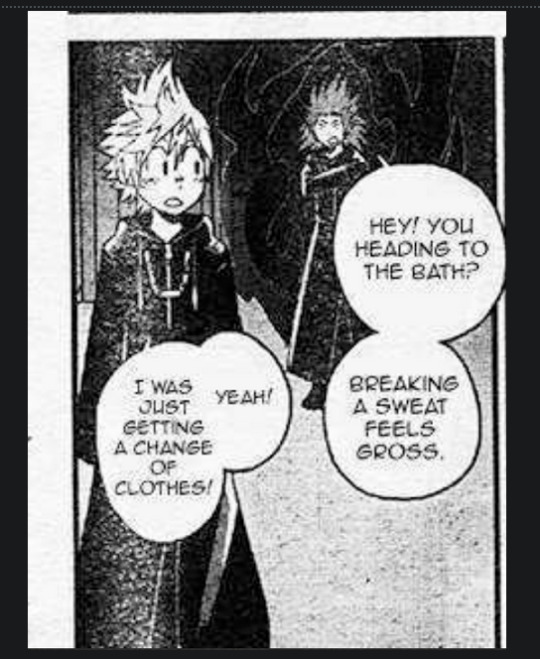
Oh look at that. Amano went out of her way to draw Roxas blushing at the concept of bathing with men. So when I say “the members of Orginization XIII bathe together”, you know that means something to Roxas, cuz the coding tells us so. There are indeed certain ways you can depict a shonen being either interested in or at least affected by that idea. You just have to mind those codes telling you what the character really feels, especially when they can’t really say it.
Speaking of blushes, Amano uses them a lot.
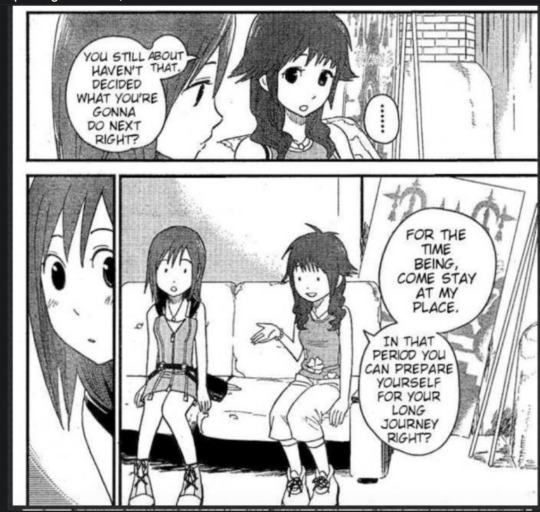
They’re a pretty effective tool for hiding gay coding into your characters cuz an anime character might blush for any number of reasons, from being flustered by their crush,
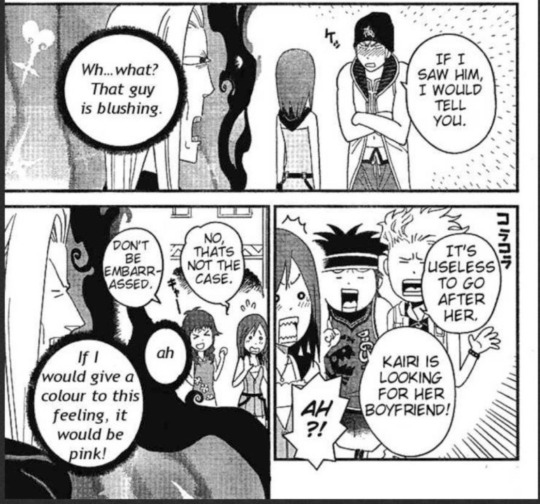
to being flustered because they don’t have a crush.
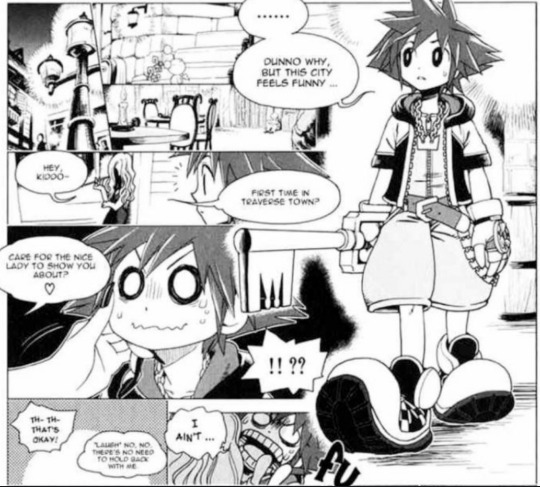
If you’ve ever translated Japanese media, (I haven’t, but I have friends who do), you know that Japanese is very vague which means you need the whole context to properly understand a scene. It’s a similar situation with queer coding. Consider this scene of Roxas blushing.
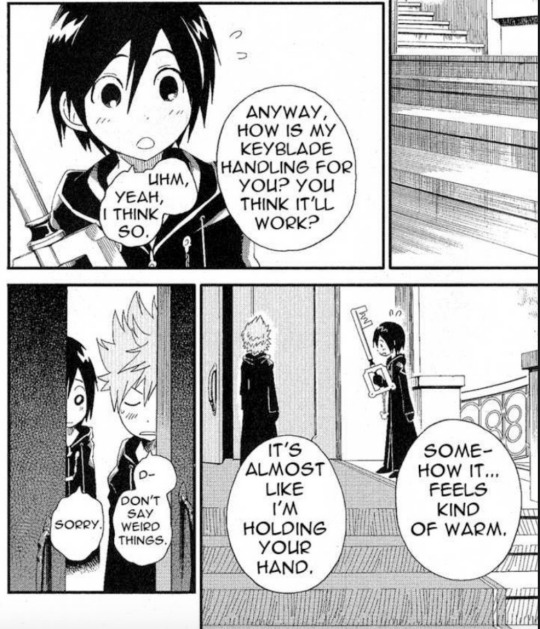
If Roxas felt positively about the insinuation that he and Xion are holding hands, how might one code this? Well, if he’s feeling really excited about it in a positive way, you might draw him smiling or expressing flattery on his blushing face. However, Roxas reacts negatively, with a frown on his blushing face. This insinuates he does not like this idea at all, especially since he also shuts it down right away in his dialogue.
But you might say “Well how do we know he isn’t just shy?” to which I say- well we can’t know. That’s the whole point of queer coding in literature. It is to say a character is queer but without actually saying it, to give plausible deniability for safety. It is to suggest a character is queer but without any confirmation. It does not mean that the character isn’t queer, however. It just means it cannot be confirmed by the text alone. However, a bold text that is very determined to have hidden queer characters without any straight explanations, will provide coding that has very little or no straight explanation.
Back to the Roxas and Xion dialogue^. This scene alone cannot confirm or deny anything. As I explained however, the suggestion that Roxas is not straight IS there. Considering the whole context, also, this scene is another piece of “evidence” to add to the pile of suggestions that Roxas isn’t straight. This coupled with the bathing panel, and this panel of him admiring Axel, his male mentor, with deep flattery during his first day of adventuring, all exist.
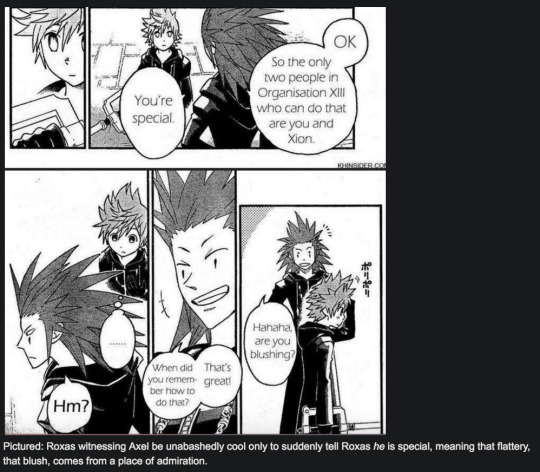
Roxas does not express negative sentiments in his blushing at men, nor does he say anything dismissive to them. When he blushes at Xion’s comment, however, it is with a negative reaction. Consider also that if the author wanted Roxas to appear straight, she would present them in ways that allude to straightness and NOT in ways that allude to queerness. Roxas would not do suggestively queer things like blush in flattery at Axel calling him special and then dismiss Xion’s suggestion that they are holding hands if he were simply coded as straight. Queering a text sometimes requires a lot of critical thought like this. This is because again, these things are hidden, and sometimes hidden really well so that unsuspecting straight people will not even consider the queer suggestions. This is one of the advantages Nomura has in his favor with Kingdom Hearts: by making it so convoluted, the gay text can be forward, strong, and blatant but remain undetected by straight powers. This keeps the series safe from oppressive scrutiny. Characters like Namine and Xion can exist as literal illustrations of compulsory-heterosexuality. And people will still think Sora and Riku are straight.
Even if I don’t know all the queer codes Japanese culture might specifically have, (and I do not, I do not live in Japan nor have any semblance of what that is like beyond what my friends who have lived there can tell me, and what I can research while sitting in my pajamas in Kentucky lol), there are certain things that are rather universal. Blushing, physical contact, lingering gazes, etc etc. Attraction is attraction and certain body language and other physical symbols will translate and will travel. So that’s the majority of what I will have to focus on.
But I do want you to know that rainbows are still gay in Japan.

Finally I also want to express that cultural intermingling is a thing. We do not live in bubbles, especially with the internet. Our cultures affect each other ALL the time. Although Kingdom Hearts is primarily a Japanese series, it is consciously tailored to appeal to both America and Japan. This is by design given the idea was to marry a Japanese hit like Final Fantasy with an American phenomenon like Disney’s media. This is why they take special care in minding the English translations and dubbing of the KH games (when they are able to do so, mistakes are still very often made and i hate it cuz they’re usually heterosexual-agenda-pushing “mistakes” =~=). The games are so intimately tied to both the Japanese and American cultures they are derived from which is part of why accurate translations are so important. And given what they would mean for queer audiences, what they represent for queer people makes accurate translations even MORE important. Some things get quite lost in translation, and some things are grossly added in translation. We will discuss that down the line...
A brief aside that I implore you to ignore:
On the subject of Roxas not being straight, I have heard of one really fun queer motif in Japanese media which is ”ryoutoutsukai (両刀使い)”, “the two sword fencer”: the dual wielding bisexual. Now- I do not necessarily think this is a means of coding Roxas as bisexual, and beyond that, from what I’ve heard in my research on bisexuality in Japan, certain age groups don’t even believe in bisexuality there. However, a love of more than one gender exists no matter who is willing to acknowledge it or not, and this motif is there. And Promisekeeper and Oblivion do rather fit the bill of representing homosexuality (Oblivion/Soriku) and heteronormativity (Promisekeeper/Sora and his childhood friend Kairi). So- while i don’t think it means anything, this fun idea is there~ I will say, however, that as far as I can tell, Nomura and his staff know exactly what they’re doing with their queer coding and are well connected to it in both cultures. So I mean- if any anime team would know bisexuality exists and how to code it, I firmly believe the KH team would, so. There is some food for thought for you~
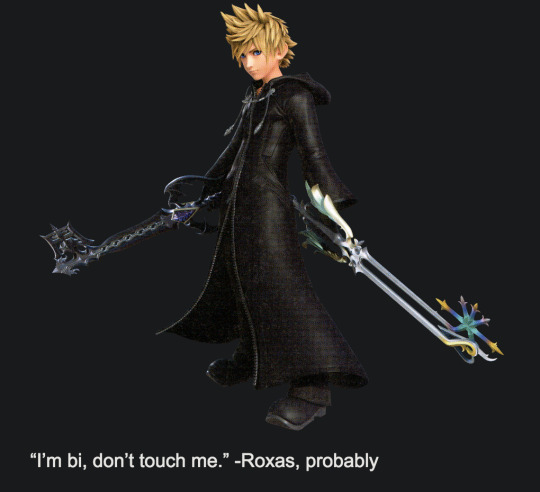
Get ready for part 3, I hope you like TWEWY~ B)
71 notes
·
View notes
Text
15x11. A game of cosmic moves, heroes, and queer subtext
This was a very interesting episode that is about a game. The game being played by two cosmic forces: God and Death. The gamblers from the title refer to both the players in the pool hall, but also to the big game that is being played by Billie, who previously mentioned taking “a calculated risk” with breaking her rules. She’s playing a game and we wonder whether Chuck is realizing that.
But it’s also an episode about people handling phallic objects and playing with balls the entire time, which has a long history on the show of being associated to Dean (and men). Plus there are swords (the phallic object for excellence) and hearts, specifically hearts ripped out, which have a long history on the show of being associated to love and sex (2x17 Heart and multiple other werewolf episodes, 11x13 Love Hurts...), and it’s no coincidence Dean mentions suffering from “heartburn”: while it’s about the digestive system, the word itself evokes the heart. Of course it’s also about Sam, who’s texting Eileen at the beginning. But it’s also about Cas, who faces another soul-sucking angel, and much has been written about that kind of mirror back in the time of 10x20 Angel Heart.
So, Fortuna. And, interestingly, her son who is called Pax, which is Latin for peace, and thus drops the concept of peace/paradise in the episode. The pool hall is run by Pax, and it works a bit like heaven, especially the old way heaven was run, when the Grigori literally fed off humans’ souls. If you replace ‘luck’ with ‘soul’ you really realize what this episode is about and what it parallels to.
In fact, I think that the episode purposely blurs together callbacks to angels and demons: the pool hall Grigori torture scene is reminiscent of Alastair, for instance, there are callbacks to Crowley, to Abaddon*, to soul-selling deals (the cowboy mentions having gotten a year of extra life, the amount of time Dean got when he made his demon deal...), but also to Michael (who literally trapped Dean inside a bar, like Evie was forced to work at the bar of the pool hall) and heaven.
*In 9x17 Mother’s Little Helper, which also features Dean playing pool (and Misha’s unsubtle directing choices), demons stole souls to make an army for Abaddon quickly, and Sam released them. The episode also featured the concept of addiction - Dean and the First Blade, Crowley and human blood, the title of the episode itself refers to drugs - and now the pool players are unable to stop playing until their luck runs out, although the game is rigged.
Now, Fortuna is a clear parallel to Chuck; she keeps people trapped in her joint to play for her amusement or whatever, just like Chuck does with his narrative. But I mentioned before replacing ‘luck’ with ‘soul’, right? That makes Fortuna the goddess of ‘soul’. Who’s the cosmic lady that rules over souls and is also making someone play the moves of her own game? Yep, Fortuna is both a parallel to Chuck and Billie. Who are indeed the players of the cosmic game that is being played.
Fortuna “reads” the players like they were stories, just like Chuck writes people like characters, but also like Billie reads the destiny of people from the books in her office. Now, Fortuna calls Dean a “beach read” and laughs when he calls himself a Tolstoy, which is a clever bit because what really is a beach read is Chuck’s pulp novels, it’s Chuck’s narrative for them, while the real Dean (et alii) are much more complex and interesting than what Chuck’s story would reduce them to. Her dismissal of Dean and interest in Sam also mirrors Chuck in a way, and we wonder whether there’s some reason for that: Dean is better at pool than Sam, as Dean states and Sam doesn’t contradict him. Pool becomes the way they challenge the deity that is pulling the strings, and Sam loses. Is it a coincidence that the thing they were supposed to trap Chuck with in the last episode was shaped like a smooth ball...?
But I also think that this could be foreshadowing of Dean & co. also putting their foot down with Billie, because it’s pretty clear that whatever plan she has for Jack, they won’t accept to play it like she wants to. The Ma’lak box plan has already been labeled a bad idea by the narrative, and I’m sure that the story will frame Billie’s plan also not as the good thing to do, but they’ll find a third way between Chuck’s story and her plan.
Fortuna differs from Chuck in a fundamental way: she understands what makes a hero. Eventually she rewards them despite their loss -- it’s not about winning, it’s about trying despite zero chances of success. They went against the goddess of luck in her own joint, they were doomed from the start, yet they tried anyway, because they care. Reminds you of something? Death made a deal with Dean, his brother’s soul in exchange of being able to being Death for a full day. Dean lost, and yet Death rewarded him anyway, because Dean was never going to be able to succeed, but he showed something in his attempt.
Fortuna’s power outdoes Chuck’s “damage” (they indeed have an “average” luck: not because they are “normal” now but because they have wins and losses, they lost Jack and now they get him back, and so on...) because she acknowledges them as “heroes” -- not because they defeated her, but because they tried anyway. It’s not being exceptional, not being stronger or whatever, but it’s about being... very human. Trying against unsurmountable odds. People against something bigger than them. That’s why they are heroes -- because they’re human.
They’re human and they care about others, even if they’re strangers. Fortuna and her pool hall are a strong parallel (even in visuals, and, well, in the inevitable homoerotic subtext layer) to Lee’s bar. Lee's bar was based on the sacrifice of innocent victims so that he could prosper; Fortuna steals luck off the people in the pool hall, until they’re sucked dry, except of luck instead of blood. Lee, in fact, was killed with a pool stick, and the meta about the homoerotic subtext writes itself. Here, the homoeroticism is maybe less ridiculously blatant than in the episode with Lee, but, hey. Dean first plays a light match with a woman, then an intense match with a rugged man with a cowboy hat; Sam only plays with a woman. Yeah. *stares at the camera*
Last week, the episode with Garth was a manual of queer subtext, now the focus is more on other aspects, but it’s still an episode about pool, i.e. sticks and balls and shooting things inside openings. I think I don’t have to explain here. You have the history of pool in the show -- Dean and Ash, Dean and Crowley, Dean and Lee... but there’s also something that is not strictly about sexuality but in general about existing as a societal “other”, an outcast, a “freak” in the Dean side of the meaning since forever in the show.
Sam states that he learned to win at pool from his brother, and acknowledges that they had to hustle all their life to eat (a little reminder that they didn’t always rely on magical credit cards to pay for living expenses...), but Sam’s history with pool wasn’t an easy one. At the beginning of the story, he was against using that kind of things to get money. From 1x08 Bugs:
Dean: So what are you saying? That Dad was disappointed in you? Sam: Was? Is. Always has been. Dean: Why would you think that? Sam: Because I didn’t wanna bowhunt or hustle pool -- because I wanted to go to school and live my life, which, to our whacked-out family, made me the freak.
Abnormality versus normality, big theme of the show and particularly clear in season 1. Sam rejects the hunting life, the life he led with Dean and John, to seek a “normal” life. But he was always trapped in a mental trap made of the concept of “freak”, because of the life he’d led growing up and the sense of being unable to fit in with normal people. On the other hand, Dean armored himself with the claim of being “abnormal”, or not fitting with normal people; but that was a mechanism of defense because he was troubled by being different. Except that the story explored how Sam’s “difference” was tied to the supernatural (his tie to Azazel, the demon blood) while Dean’s “difference” was always framed as something fundamentally human, fundamentally tied to his relationships with people. You know what the subtext was always about.
So hustling pool was always a metonymy for a wider picture, the life the Winchesters led in the margins of society, in an underclass environment Sam rejected and took a long time to accept, and Dean embraced because he felt like he couldn’t belong anywhere but there. (“I’m a freak among normal people because I’ve been raised in an abnormal environment” versus “I’m a freak so I belong in an abnormal environment”, in substance.)
So, hustling pool doesn’t equate queerness per se. In Sam’s case it definitely doesn’t, but Sam embracing it equates him embracing being different in a class sense and in a general hunting-life sense. But in Dean’s case, his “being different” was always connected to a different set of subtextual meanings. Sam was “wrong” because of the demon blood and all that jazz, Dean was “wrong” in a sense of societal expectations.
So pool is connected to queer subtext in a stricter sense but also in a larger sense, the semantic area of otherness, of outcast, of freak, of being in the margins. And they play for the ability of going against God -- a God that, in Fortuna’s speech, is framed in opposition to other deities (non-christian deities, female deities, non-white deities) and that represents societal order.
Now about the game. In 5x07, whom this episode is obviously a big parallel to, the high-stake game was poker. Another obvious parallel is to the Ingmar Bergman movie The Seventh Seal, where a man plays a game of chess against Death.
In 5x07, Sam won, now he loses. It’s a fundamental difference that brings us back to what the current narrative is telling us about what makes a hero. All the stuff about luck and whatnot is irrelevant -- Chuck wants us weak, Dean says, and he’s probably right, Chuck is doing this to undermine their confidence, but it’s not a matter of strength/weakness or even confidence. They’re heroes because they’re human, because they’re not special. Against someone stronger than them, like a deity, they lose. But the point is that they play. That’s what matters. They’ve always faced adversaries more powerful than them, situations where they couldn’t win. But they fought anyway. And now, Fortuna is right in saying that they need to fight Chuck by their own rules, not the rules of his game: Chuck will win his own game, because he’s God and they’re just human. But if they play their own game, it will become irrelevant that they’re just human and he’s all-powerful. And, of course, their game means more players, just like Garth attacked the big vampire from behind.
The point is that Dean and Sam aren’t particularly strong or special in any way. They’re going to win because they are not alone.
158 notes
·
View notes
Text
i need to be writing instead of reading comic books
but after I post this it’s back to the grind
Spoilers for Willow #4: “The subtext is rapidly becoming text” (actually there isn’t a chapter name for this issue. Purposeful? Read on)
In the many, many years since Buffy has been off the year, and tbh during its run, a lot has been written about the metaphors the show used to stand in for real life terrors. My opinion is that when they did it correctly, it was subtle and fit the story - and when it wasn’t...it really, really wasn’t. Anvils of foreshadowing, if you will.
One of the takes was that the vampires represented homosexuality/queerness - which I don’t agree with, because that aligned gayness with something bad or immoral, and when the vampires weren’t shown to have grey nuances, they were complete monsters with no redeeming qualities whatsoever.
However the show definitely played around with Otherness in regards to Buffy and the Scoobies in varying degrees: the feeling that you’re the only one/no one will understand/you exist on the fringes from mainstream society, and chosen family because the people who are supposed to care for you don’t and can’t understand.
It’s about identity and finding out who you are and what you do with that knowledge.
Identities and queerness is something that the Willow miniseries has baked in from the very first issue. Willow is lost and trying to figure out who she is - not just as Xander and Buffy’s best friend, Rose’s ex, dutiful daughter and excellent student and survivor of trauma. She is trying to figure out where she fits in post Hellmouth and losing Xander (who is a huge part of her life and as we see in this issue, the one person who made her feel like she belonged pre-meeting Buffy.)
She even divides her life like this: Pre Buffy and After She Went to Hell and Back. The dangling thread metaphor is a lovely way to sum up Willow’s feelings - she continually references not feeling comfortable in her skin, and being a little undone, of being an Other in Sunnydale. This could refer to both her sexuality and not fitting in with Sunnydale’s typical ‘ignore it and it will go away’ vibes/and also high school is just difficult for different kids. Her circle is really two people at the beginning - Xander and Rose. When she meets Buffy, it expands to include Buffy, Giles and Ms. Calendar (I’m sure Willow knew Ms. Calendar before, but it was in a strictly teacher/student way and not Ms. Calendar knows the big picture and is almost a friend way).
And for a while - that’s enough for Willow.
But then Xander is taken away. He’s her anchor, moreso than Rose was. And even though Jordie didn’t write the Willow comics, it’s a really lovely thing to see Willow and Xander’s platonic bond as the emotional core of the series repeated in her miniseries. Romantic relationships often take precedence over platonic relationships (especially those between men and women) so it’s refreshing that the Boom!verse acknowledges how important Willow and Xander are to each other. They love each other and the loss of that love unravels Willow. She’s suddenly that dangling thread again. As much as she cares for Buffy, and Giles, and the new Scooby gang, Xander is her person.
Without him, everything else doesn’t seem to fit right - so when she settles into Abhainn, it all clicks. Suddenly she’s in a place where everyone else is like her - the comic uses the witch identity as a nod to Willow’s interests, but really, it’s also not subtle shorthand for Willow has found a queer community. The word ‘witch’ comes up a lot in this issue but it might as well be LESBIAN in bright flashing lights.
It’s a self sustaining commune, where it seems to be a primarily plant based lifestyle, with cozy sweaters and women of all races and ethnicities and flowing dresses and undercuts and mason jars and it might as well have a flannel emporium and home improvement store, you know?
The way Willow talks about witches and how it saved her life - I felt also applied to when one realizes their sexuality. She doesn’t have to pretend or feel like an Other in Abhainn, she’s accepted as she is because everyone else is like her.
Except...the whole secret town hidden from the majority and everyone believes the same thing and dismisses the outside world kind of sounds less like a utopia and more like a cult. (Call your best friend, you’re in a cult)
And the cult leader is the charismatic, older Aelara, who praises Willow constantly and tells her how special she is, how necessary she is to Abhainn. Willow may even have a little bit of a crush on her.
It’s only when a mysterious blonde bursts into Willow’s room that her life changes again. This girl has a completely different take on Abhainn, and the fear in her eyes gets through Willow’s rose-tinted glasses. Because Willow’s had these doubts too, but didn’t feel she could do anything, because so much about Abhainn feels right.
Who is she? (*cough* Tara? We shall know soon enough.)
Like the other blonde in Willow’s life, she’s inspired to take action and to figure out what Abhainn’s secret is and they meet in the woods to leave - where they’re met with a pack of wolves.
Willow’s power has increased over the span of the comics and she manages to stop the wolves in their tracks. Only to be met with Aelara who is no longer channeling Stevie Nicks but a hooded, scary figure. She tells them they can’t leave.
It’s a really great place to end on for the penultimate issue because there is a real sense of danger - we know Willow does make it back to Sunnydale, but the how and why will be explained, hopefully in the last issue.
This maybe Tara character has promise - she asserts herself in front of Willow’s doubts, has a family that doesn’t know where she is, implying they would care that she’s been missing. And the fact that Willow just trusts her at her word and does the scary thing to meet in the forest at night shows the glimpse of the Willow post Buffy - a girl who does question the status quo, who does fight for what she believes in, even if it’s hard and terrifying.
Another excellent issue.
#willow comics#boom! verse#boom! studios#thoughts and reactions#read this miniseries if you haven't#really stresses that people should have facets to their personality and shouldn't define themselves by One Thing
5 notes
·
View notes